#state route 150
Explore tagged Tumblr posts
Text


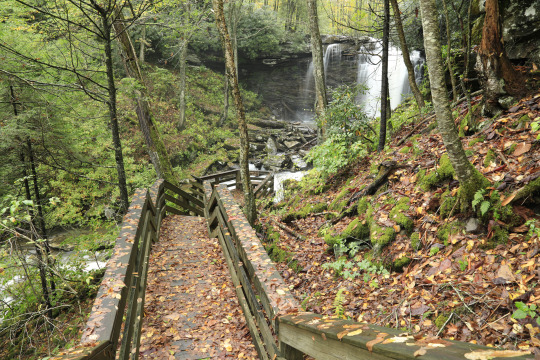









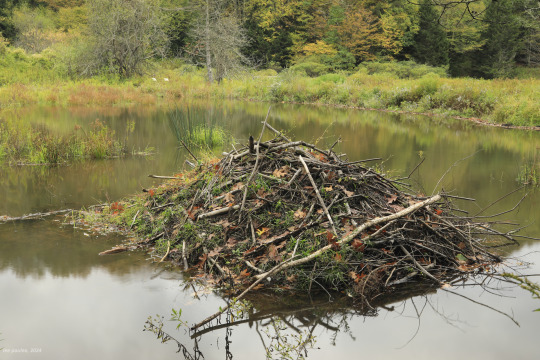
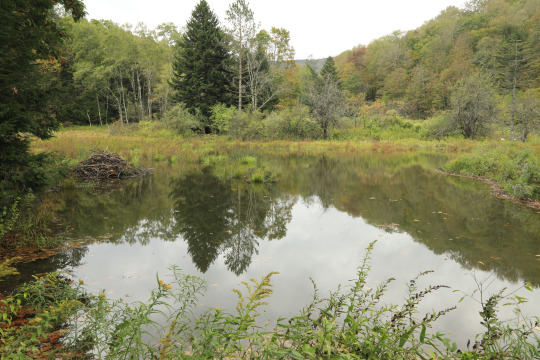



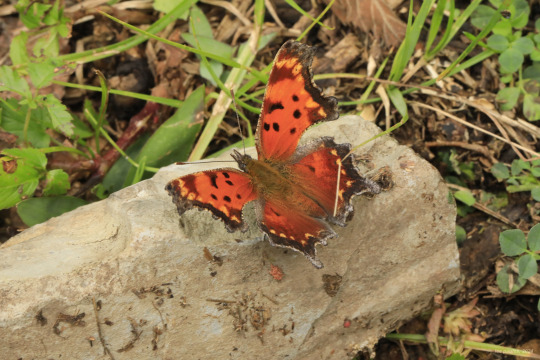
In the shrinking sunlight of early October, life in Central Appalachia's forests and fields shows no signs of slowing down. A proliferation of asters and goldenrods fuels an insect feeding frenzy, at the same time ensuring that a late season eruption of seeds before the first frost will bring new life in the spring. From top: dog tooth lichen (Peltigera canina), also known as felt lichen, whose lobes are tipped by red apothecia ; large cranberries (Vaccinium macrocarpon), which dot wet mountain meadows and bogs; crooked-stemmed aster (Symphyotrichum prenanthoides); brown-eyed Susan (Rudbeckia triloba), which blooms later than black-eyed Susan and has three-lobed basal leaves; a bumblebee (Bombus) taking nectar from purple-stemmed aster (Symphyotrichum puniceum), also known as swamp aster; an American hoverfly (Eupeodes americanus) similarly drinking from purple-stemmed aster; blue wood aster (Symphyotrichum cordifolium); question mark butterfly (Polygonia interrogationis); and wrinkleleaf goldenrod (Solidago rugosa), also known as rough-leaf goldenrod.

#appalachia#vandalia#west virginia#wildflowers#flora#allegheny mountains#fall#autumn#insects#lepidoptera#monongahela national forest#falls of hills creek#cranberry glades#dog tooth lichen#felt lichen#large cranberry#crooked-stemmed aster#purple-stemmed aster#swamp aster#brown-eyed susan#bumblebee#american hoverfly#question mark butterfly#wrinkleleaf goldenrod#roughleaf goldenrod#highland scenic highway#state route 39#state route 150
91 notes
·
View notes
Text
hey hey
remember the other day when biden's top adviser for the latam region talked about the lithium in Argentina as 'ours'????
#fun times!!!!#i love it when they don't even bother to lie#just straight up letting us all know they consider our natural resources theirs lol. lmao even#us imperialism#and then you have shit propagandist like the economist publishing their op Ed's and articles like 'why argentina won't leave its crisis'#like idk fam maybe bc your country's stated policy for the last 150 years as been to systematicly fuck our economy so you can steal from us?#just food for thought#hahahahahaha#anyways people should be more watchful about the situation wrt the lithium in latam#how quickly we have forgotten about elon musk and the usa stagging a coup in Bolivia over it that ended with +50 deaths#the worst is they don't even have to go that route there. we have enough cipayos and dumbasses to do their dirty work
3 notes
·
View notes
Text
Tangled

Clarisse la rue x repunzel!pesephone!fem!reader
Reader spent their entire life hidden away in a tower to protect her from the outside world wanting her for her powers, its only when a certain daughter of ares finds her scared and confused, that she finally gets to see the outside world like she always longed to.
Warnings:
Toxic parents, yandere!parents, oblivious!, Clarisse being stubborn, overprotectiveness, cannon typical violence, readers not got the best survival instincts 😭, reader is blonde, more to come maybe
Gods had a weird way of protecting people. And while you could confidently say they your parents were never intending to harm you or your siblings. They definitely went about it in weird ways.
Of course you never realised this, being locked away in a tower your entire life was all you even knew. You didn’t understand that your life wasn’t normal.
You didn’t realise you weren’t the only child your parents had hidden off in magical locations to protect them from Zeus and the dangers of the world in their own twisted ways.
And so you stayed where you were, waiting in your tower for the days that your parents would come and visit or the few creatures of the forest you had befriended came to your window.
With not much else to do but paint or read everyday in the same walls. Your hair growing and failing to ever stop, getting to the point of it being constantly in the way.
🍊☀️🪷
Clarisse was beyond confused.
She was 150% sure they had come the same way they had 100 times before. She was convinced. And yet there had never been a giant tower int he middle of the path all the other times they had taken this route.
Her brother suggested that maybe they took a wrong turning, surely they were just lost.
But Clarisse refused to acknowledge the idea she could even being wrong, no she was curtain they came the right way.
Besides they needed somewhere to camp out for the night anyway, so she took off towards the tower.
“Clarisse what are you doing?” Her brother shouted after her, the girl from the Hermes cabin turning to give him a look of annoyance.
The two followed after the girl, watching for a while as she searches around for some sort of entrance before giving up and turning back to them.
“Come on, we need to find a way up” Clarisse tells the two, not being able to find any sort of entrance other than the window near the top of the tower.
“Why?” The blonde girl asked in annoyance, “can’t we just go find somewhere to settle for the night?”
“Yeah clarisse it’s getting late, we can find our bearings in the morning” her brother added.
“This is somewhere to settle for the night” Clarisse stated plainly, rolling her eyes when the two stared at her in confusion, “it’s a giant tower in the middle of nowhere with no doors…no one’s living up there”
“I don’t know Clarisse…I mean this is meant to be a satyr trail, surely someone’s up there” the boy tried to reason.
“Aren’t you curious?” Clarisse asked, “I know we came the right way, this part of the route is blocked off, there is literally no way we got lost”
She was right, this small section of the trail was hidden away, you could only get in and out through two small entrance/exits, covered by plant life to hide it off.
They had been through the secret path a million times and never once was the tower there.
“Well how do you expect we get up?” The girl asked in defeat.
Clarisse looks around for a moment, before grabbing the bag off of her back and pulling out two daggers and holding them up to the two.
“No” the elder boy stated, to which Clarisse turned and made her way towards the walls of the tower, grabbing onto the vines to test their strength, “no no no Clarisse stop it right now”
The girl ignored him, stabbing the dagger into the wall inbetween the cracks and using both of them and the vines to begin to pull herself up the wall.
“I swear to god Clarisse get down right now!”
“I’ll see if there’s another way to get up once I’m up there” Clarisse calls down to them as they stare at her dumbstruck.
“I’m gonna kill you when you get down!” he called up to her.
“I hate your sister” the blonde said to the boy nonchalantly, collapsing to sit on the floor and wait for the ares daughter to be done you her adventure so they could get to bed.
“Tell me about it” the boy replied glaring up at her as she made her way to the top.
Clarisse made her way up, using the, surprisingly strong vines and plants growing off of the tower as her main support on the way up.
Once she made it to the window she pulled herself up on to the ledge, looking down to see her quest mates sat on the ground talking, rolling her eyes at the sight.
She quietly forced the shutters of the large window open, stepping on the flower bed as she climbed through into the room.
🍊☀️🪷
You hadn’t heard anything while Clarisse had been climbing up the walls, busy in your room painting as she entered into the main room of the tower.
Your hair was laid around the different rooms, leading through doors and hanging from ceilings in an attempt to keep it out of your way, something Clarisse stared at in confusion as she quietly wondered around the room.
She was clearly wrong about no one living in the tower, there were candles and lights lit across the room, and a fire lit int he fireplace.
The kitchen was full of food and everything was relatively clean. And not to mention the yards and yards of hair laid across the place.
That’s what confused Clarisse the most, surely no human had this much hair.
She was shocked out of her thoughts when she stepped backwards, tripped on some of said hair and fell onto the floor, alerting you in the other room.
You heard the noise and turned around quickly, your hair curling round you slightly causing it to tug, getting caught underneath Clarisse and yank on your head slightly. Making you squeak in shock.
Clarisse heard this from the other room, her eyes widening as she looking towards the doors that someone clearly resided in.
Both of you grabbed your weapons, Clarisse clutching one of her daggers, and you running to grab a vase off of a cabinet. Inching your way towards the door that separated the two of you as Clarisse stood up.
Clarisse started to walk up the stairs towards the door as you walked down the hallway, both of you stopping at the door before Clarisse decided to push through it suddenly.
You screamed as the mystery girl collapsed on top of her, hair covering your face as you flailed about, trying to get her off of you as she try’s to find the dagger that she lost on the floor.
“Get off of me” you grunted, pushing the hair out of your eyes and attempting to push her off of you, “who are you?”
Clarisse finally finding her dagger, held it to your throat, causing you to stop fighting back, breathless and staring at the weapon in her hand with wide eyes.
“Who are you?” Clarisse retorted, glaring down at the girl as if she wasn’t the one breaking and entering.
“You’re in my home” you say back in shock, frowning at how the knife gets closer to you.
“And I’m holding the dagger…see how this works?” Clarisse tells you with a smirk, flipping it in her hand as she kept it near your throat.
“I-I’m y/n…” you replied slowly, not knowing what to tell her. Looking at her with wide eyes as she huffs in realisation that it wasn’t the most helpful question to ask.
“Well why do you live here?” Clarisse asks noticing the way the girl looked confused and adding, “I mean you’re in the middle of the forest in a tower with no doors…”
“And I mean what’s going on with your hair, it’s so long” Clarisse continued, “and who uses a vase as a weapon?”
You didn’t really know what to say to any of that, looking at her blankly.
“I…don’t know” you answered eventually, adding in a small voice, “can you please get off of me”
Clarisse sighed, getting up slowly but still holding the dagger pointed towards her as she did.
“Why are you in my house?” You asked meekly, staring at the dagger in fear. Clarisse rolled her eyes noticing your wariness, putting the dagger down to her side to try calm you down.
“I’m not gonna hurt you unless you try anything ok?” Clarisse stated, “I was just looking to see if we could stay the night in here, I didn’t realised anyone lived here or anything”
“We?”
“My friends, well not really my friends but, well they’re just outside” Clarisse told you, “why are you in a tower by yourself exactly? And seriously what’s going on with your hair”
“I just live here…I don’t know what you mean” you answered, “and I guess it’s just my hair…my mum says it’s special”
“Your mum? Special how what do you mean”
“I don’t know it just is” you said, “w-wait, no, I’m not meant to tell anyone that”
Clarisses eyebrows furrowed at that, looking at you as though you were an idiot causing you to blush at her.
“Why can’t you tell anyone about your hair…” Clarisse asked.
“Mummy said not to” you said hesitantly.
Clarisse smirked at that, only seconds ago you said you couldn’t tell anyone and yet here you were continuing on with the subject.
“And mummy is?” She asked condescendingly, something you didn’t pick up on as you went to answer.
“Ummm Persephone…” you responded simply.
“What?” Clarisse asked in confusion, looking at you like you were mad. Sure, she knew you couldn’t be mortal, but a demigod?
She supposed the flowers and plants in full bloom in autumn made sense by that, it didn’t quite explain the hair but she was sure it had something to do with that.
“You’re a demigod?” She asked in confusion.
“What?” You replied, furrowing your eyebrows as you looked at her, “what’s that?”
Clarisse stared at you for a moment, you felt like she was scrutinising your entire existence as she looked you up and down.
Suddenly she grabbed your arm and pulled you towards the door, you stumbling as she continued down the stairs towards the main room of the tower and leaving you stood in the middle.
You watched her as she made her way to the window, opening it again and shouting down at her ‘friends’ she told you about earlier.
“It’s all safe” Clarisse shouted, before turning back to you, “do you have any rope?”
You looked at her in shock that she was just inviting people inside your home, speaking when she sent you a look of annoyance, “no?”
Clarisse looked around the room for a moment before settling on your hair that hung around the room, turning back to you with a new look in her eyes.
“You sure?” Clarisse asked, leaning down to pick up your hair and hold it up for you to see.
“W-what? No you can’t use my hair!” You told her, rushing forward to remove it from clarisses hands leaving you stood right in front of her.
She looked down at you with a smirk, taking the hair back, “come on, they won’t hang from it or anything, they just need something to hold for leverage to get up”
You rolled your eyes with a pout at that, looking up at her before walking towards the window, looking down at the two on the ground, who were now beyond confused at the blonde girl appearing.
You leant over to reach the walls of the tower then, Clarisse running over to hold on to you as you stumbled slightly, “be careful!”
You blushed feeling her hands on your hips, shaking yourself out of it and leaning down to touch the plants and vines attached to the stone.
Clarisse watched as the plants grew, covering the side of the wall all over and bits of vines hanging down for the two at the bottom to hold on to.
Once it was fully grown you turned back around to Clarisse, underestimating how close you both were when you did so.
You smiled up at the shocked look on her face, proud of yourself for figuring out a solution to the situation, hearing clarisses brother begin to scale up the side of the wall as you and Clarisse faced each other.
Taglist:
@slaggylemon @yourmom-25s-blog @l0veshellarcelia @asvterias @ashisabitgay
Wanna rewatch tangled now 🤩
Pretty sure this is shit but oh well
#clarisse la rue#clarisse la rue x reader#clarisse pjo#clarisse la rue x fem!reader#clarisse x reader#percy jackson#clarisse la rue x y/n#toxic!clarisse la rue#tangled#clarisse my beloved#clarisse x female reader#luke castellan#repunzal#repunzel#pjo x reader#percy jackson x reader#percy pjo#percy series#clarisse larue#percy jackson and the olympians x reader#ares pjo#percy jackson fanfiction#luke castellan x y/n#pjo tv show#wlw#clarisse#annabeth chase#Pesephone#hades
617 notes
·
View notes
Text
Amy Appelhans Gubser could see the Farallon Islands from her house on clear days, and would always joke with her husband that she could swim there.
5 years ago, the nurse and grandmother who lives in Pacifica started to work on this crazy idea. Gubser sought out open-water swimming mentors for guidance and even got resources through the Marathon Swimming Federation, yet things never lined up until this year.
On May 11, in 17 hours, 3 minutes, she finally made her vision come true and completed the 29.6-mile swim from the Golden Gate Bridge to the Farallon Islands.
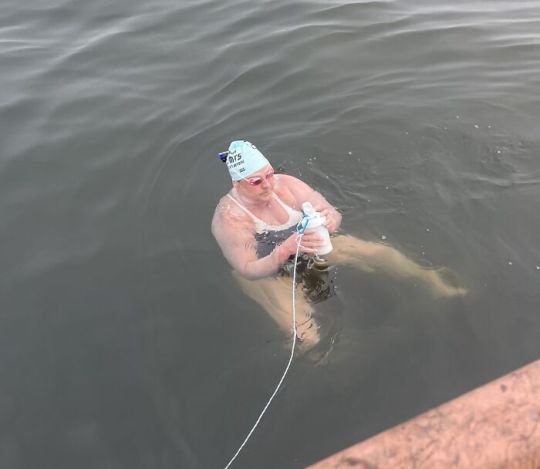
Gubser has been around the ocean since she was 10 years old. She became an ocean lifeguard in high school and college, and also swam at the University of Michigan, yet after graduation didn’t get back into the water for 24 years.
When Gubser finally did return, she was doing more open-water swimming, for instance, swims across Lake Tahoe and Monterey Bay. The woman would always see the Farallon Islands from her house and would dream about one day swimming there.

The outbound route to the Farallon Islands is known for going against the currents, and only 5 people had previously completed the trek in the inbound direction, from the Farallons to the Golden Gate. According to the Marathon Swimmers Foundation, Gubser is the only one to complete that specific route without a wetsuit. Before her, two men successfully completed the swim in 2014, and there were also 3 recorded failures between 2012 and 2015.
The location is also known for white sharks. “The elephant in the room is white sharks, and they were in the back of my mind at all times during the swim. We didn’t take the shark thing lightly – I had a savvy crew that kept watch for them from a boat and kayak. They were ready to jump into the water to help me if I needed, but we had no shark sightings the whole time,” said Gubser. Fortunately, during the journey, she encountered several seals yet no sharks.
Another obstacle was the water temperature. She had trained to swim in cold water, but the water got as cold as 46 degrees Fahrenheit that day and it was something the woman didn’t expect and wasn’t ready for. A wetsuit probably would have helped here, but no matter the warmth and added buoyancy, she wasn’t wearing it.
“Wetsuits are a great piece of equipment, especially for people that are starting out in open water. But I follow the Marathon Swim Federation rules and the open water swim world rules that, for the last 150 years, have been the same. Which is a swimsuit, a cap, some form of goggles, earplugs and a nose clip,” explained Gubser. “When you wear a wetsuit your skin rubs against the material, and the last thing that I really wanted was for my skin to bleed near a shark island.”
The 55-year-old grandmother of two with a third on the way was very happy about her accomplishment when, no matter all the challenges, including intense fog in the Pacific Ocean all along the way, she finally reached the Farallon Islands at around 8:30 p.m. that night.
“For 17 hours, I had no idea where I was, what was going on. I had a thought bubble around me that only allowed us to see 100 meters in any direction. I went into a meditative state. There were some 30-minute time intervals that passed very quickly. Others seemed like they were 300 hours,” she explained.
“My whole family is so relieved, because I have been talking about this thing for five years, and my husband will be the first to tell you he’s just grateful it’s done,” shared Gubser. “I hope this story inspires somebody to not be challenged by a number [like] their age or their weight. I mean, all of my body got me across that. That’s pretty impressive.”
160 notes
·
View notes
Text
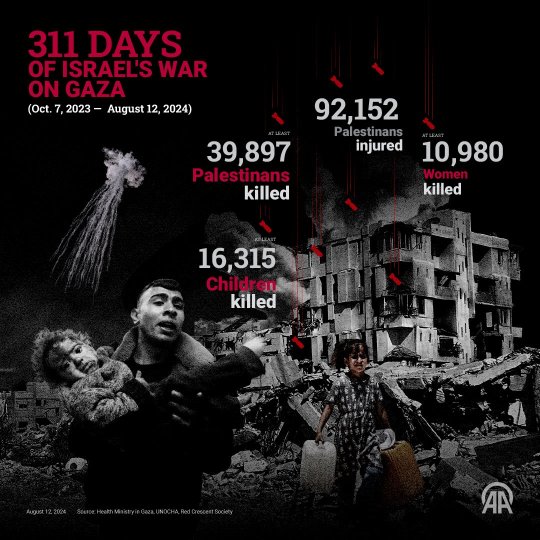
[ 📹 "We were sitting in the house, all of us were civilians," a Palestinian man says while holding the body of a dead child after their home was bombed by the Israeli occupation forces.
"Suddenly the house collapsed on us. The entire house is full of children, as you can see. This child is less than two months old. He was born during the war," the man says before asking, "For what sin was this child killed? This is an innocent child. Is this on Netanyahu's target list?" ]
🇮🇱⚔️🇵🇸 🚀🏘️💥🚑 🚨
GAZA WAR DAY 311: GALLANT SLAMS NETANYAHU CLAIMS OF "COMPLETE VICTORY", ISRAELI OCCUPATION CLOSES SEVERAL AREAS IN GAZA NEAR BORDER, ETHNIC CLEANSING OF GAZA REACHES NEW MILESTONE WITH 84% OF TERRITORY UNDER MANDATORY EVACUATION ORDERS, GENICIDAL WAR CONTINUES WITH MASS MURDER OF PALESTINIAN CIVILIANS
On the 311th day of the Israeli occupation's ongoing special genocide operation in the Gaza Strip, the Israeli occupation forces (IOF) committed a total of 3 new massacres of Palestinian families, resulting in the deaths of no less than 142 Palestinian civilians, mostly women and children, while another 150 others were wounded over the previous 24-hours.
It should be noted that as a result of the constant Israeli bombardment of Gaza's healthcare system, infrastructure, residential and commercial buildings, local paramedic and civil defense crews are unable to recover countless hundreds, even thousands of victims who remain trapped under the rubble, or whose bodies remain strewn across the streets of Gaza.
This leaves the official death toll vastly undercounted as Gaza's healthcare officials are unable to accurately tally the number of those killed and maimed in this genocide, which must be kept in mind when considering the scale of the mass murder.
Beginning on Monday, August 12th, the Israeli occupation army has announced it will close several areas within the Gaza envelope near the border with "Israel" following the assessment of the army.
The order was signed by occupation army Maj. Gen. Yaron Finkelman, head of the Israeli occupation forces' Southern Command.
The evacuation calls for several areas along the border between Gaza and Israeli-occupied Palestine to be added to the "closed military zone", prohibiting entrance without prior coordination with the army.
The announcement was made after Israeli colonial settler activists planned to hold a prayer event on the Gaza border, with the activists seeking to alter the government's position against the resettlement of Gaza by the colonists.
The newly closed areas include the fields between the Erez crossing, Yad Mordechai, to the Shaar HaNegev Junction, and Nahal Oz, as well as the fields between the access road to the cemetery in Netivot and Route-234 to the Gaza Security barrier.
Additionally, the areas between the Re'im and Urim Junctions, to the security barrier will also be closed, according to the army.
In other news on Monday, Zionist Defense Minister Yoav Gallant spoke during a meeting of the Israeli occupation's Security Committee hearings in which he gave an overview of the progress of the genocidal war in Gaza.
During the meeting, Gallant slammed the Netanyahu administration, declaring that "I hear the tam-tam drums and this chatter about the absolute victory, it's a shame that in the room they didn't show the same courage," referring to the Israeli security establishment, which previously proposed pre-emptive strikes against Hezbollah near the start of the war.
“The conditions today for war in Lebanon are unlike those at the beginning of the war," Gallant continued.
"Maybe I don't understand the media and the talk, but I understand security, today we are in a completely different situation than we were when I insisted on an attack in the north that the entire security system supported," he added.
Gallant then responded to questions in which he stated that the position of the Rafah Brigade in southern Gaza had been "decided". He added that, for the dozens of hostages who remained alive, it was worth withdrawing from the so-called "Philadelphi Corridor" for a period of 6 weeks, during which, negotiations could proceed in phases and actions be taken.
Following the meeting, the Prime Minister's Office responded to Gallant's comments, declaring that he "is bound by 'absolute victory' too."
In a statement issued by Netanyahu's office, the occupation Prime Minister determined that "When Gallant adopts an anti-Israel narrative, he hurts the chances of reaching a hostage deal."
"He should have attacked [Hamas leader Yahya Sinwar], who refuses to send a delegation to negotiations, and who was and remains the only obstacle to the hostage deal.”
It should be noted that the Hamas resistance movement has repeatedly agreed to the terms of the Biden administration's proposed hostage exchange and ceasefire agreement, only to see the Israeli Prime Minister change the terms of the agreement, add new conditions, or, most recently, assassinate the lead negotiator, former Hamas Political Bureau leader Ismail Haniyeh.
The Prime Minister's Office reiterated its stance that the Israeli entity must achieve "absolute victory", which Netanyahu claims can only be accomplished through the elimination of the Hamas resistance movement's military and governance capabilities, as well as the release of the Israeli hostages that continue to be held by the Palestinian resistance forces in Gaza.
The Office's statement concludes by stating that "This is the clear directive of Prime Minister Netanyahu and the cabinet, and it is binding on everyone — including Gallant."
Meanwhile, in more news, Zionist colonial settlers continue storming the Al-Aqsa Mosque compound on a near daily basis, continueing to tread on established agreements and destroying what remains of the status quo.
According to local reporting, dozens of Zionist settlers stormed the mosque compound while under the protection of the Israeli occupation forces and Shin Bet security services, carrying out tours of the compound and performing provocative rituals while blocking Muslim worshippers from entering the compound.
On Sunday, "Temple Groups" of more than 370 colonial settlers stormed the compound, announcing their intention of establishing a human chain surrounding the mosque and calling for its demolition.
At the same time, Shin Bet police turned the Old City area of Jerusalem into a military barracks, deploying hundreds of its security officers in the streets and near the Al-Aqsa Gates, as well as the gates to the Old City.
In other news on Monday, the Israeli ethnic cleansing of the Gaza Strip reached a new milestone, with more than 84% of territory under mandatory evacuation orders by the Israeli occupation army.
In a report published by Turkish news outlet Anadolu News Agency, Anadolu cites the deputy spokesperson for the United Nations Office for the Coordination of Humanitarian Affairs (OCHA), Farhan Haq, as saying that the Israeli occupation's "ongoing bombardment and hostilities in Gaza continue to kill, injure and displace Palestinians- as well as damage and destroy the homes and infrastructure they rely on."
"Two evacuation orders were issued by the Israeli military over the weekend for Khan Yunis, mostly for areas that were previously placed under evacuation," Haq said during a press conference on Monday morning.
Farhan Haq went on to point out that around 23 displacement sites, along with 14 water, sanitation and hygiene facilities and four educational facilities have been effected by the occupation's evacuation orders.
"In total, about 305 square kilometers (117.7 square miles), or nearly 84% of the Gaza Strip, have been placed under evacuation orders by the Israeli military," Haq said during the press conference.
He also noted that the entry of humanitarian aid supplies into the Gaza Strip has been severely restricted as a result of "active hostilities, access constraints, high levels of insecurity, the lack of public order and safety," as well as other factors.
During a back and forth with reporters, Haq responded to a question about whether a "genocide" is unfolding in Gaza by saying that there would need to be "a judicial ruling" by the appropriate courts to label it as such.
While referring to previous comments regarding the situation in Gaza, Haq said that "these are alarming figures for any conflict anywhere," and also called for a ceasefire.
Meanwhile, the Israeli's genocidal war continues unabated, with the constant slaughter of civilians and near complete destruction of Palestinian housing, facilities and infrastructure amid the constant bombardment of the Israeli occupation forces (IOF).
Beginning on Monday morning, local ambulance crews reported the recovery of two dead bodies from the western neighborhoods of Rafah, in the southern Gaza Strip.
According to local reporting, Occupation forces bombarded residential homes in the Tal al-Sultan neighborhood, west of Rafah, in the southern Gaza Strip, killing two Palestinians who were recovered by local ambulance and civil defense crews.
The Israeli occupation army also detonated an entire residential block in the town of Abasan al-Jadida, east of the city of Khan Yunis, in the south of Gaza.
Prior to that, on Sunday evening, Israeli aircraft bombed a number of civilian homes in the Sheikh Radwan neighborhood, north of Gaza City, as well as in the Nuseirat Refugee Camp, in the central Gaza Strip, and in Rafah in southern Gaza.
According to local reporting, Zionist warplanes bombed a residential house belonging to the Hamdan family west of the Nuseirat Camp, in the central Gaza Strip, resulting in the deaths of two Palestinians and wounding several others.
Similarly, on Monday morning, occupation fighter jets bombed a residential home belonging to the Murad family west of Gaza City, killing two civilians and wounding a number of others with various injuries.
In another atrocity, Zionist forces targeted a gathering of civilians near the Badr Mosque in the Al-Zaytoun neighborhood, southeast of Gaza City. Following the strike, Palestinian Red Crescent Society (PRCS) paramedics reported the transfer of three dead Palestinians and a number of wounded to Al-Ahli Baptist Hospital in the city.
Moreover, throughout the day, Israeli occupation forces began several waves of intense bombardments targeting the city of Khan Yunis, in southern Gaza, resulting in dozens of casualties throughout the day.
Zionist artillery shelling and airstrikes targsted the residential home of the Al-Najjar family in the Ma'an neighborhood of Khan Yunis, killing several Palestinians and wounding others, while occupation forces also bombed a civilian vehicle in the vicinity of a refueling station on Salah al-Din Street, east of the Khan Yunis, killing at least three Palestinians and wounding 10 others.
It was also reported that Zionist soldiers fired smoked grenades towards neighborhoods east of the Al-Zaytoun neighborhood, southeast of Gaza City.
The Israeli occupation army continued its horrific war crimes by bombing a civilian residence in the town of Abasan Al-Kabira, east of Khan Yunis, in southern Gaza, killing more than 10 Palestinians and wounding a number of others.
On Monday evening, occupation aircraft bombarded a residential home belonging to the Darwish family in the Al-Maghazi Refugee Camp, in the central Gaza Strip, killing one civilian and wounding several others, while another bombing of the Al-Sayed family home on Block-9 of the Al-Bureij Camp, also in central Gaza, killed a Palestinian citizen and his son.
In another criminal bombing, occupation forces targeted the residential home of the Abu Alwan family in the Sheikh Radwan neighborhood of Gaza City, resulting in a number of dead and wounded.
Additionally, Zionist warplanes bombed another residential house in the town of Al-Qarara, northeast of Khan Yunis, killing two Palestinian civilians and wounding several others.
As a result of the Israeli occupation's ongoing war of extermination in the Gaza Strip, the death toll now exceeds 39'897 Palestinians killed, including at least 10'980 women and more than 16'315 children, while another 92'152 others have been wounded since the start of the current round of Zionist aggression, beginning with the events of October 7th, 2023.
August 12th, 2024
#source1
#source2
#source3
#source4
#source5
#source6
#source7
#source8
#source9
#source10
#source11
#source12
#videosource
#graphicsource
@WorkerSolidarityNews
#gaza#gaza strip#gaza news#gaza war#gaza genocide#war in gaza#genocide#genocide in gaza#israeli occupation#israeli genocide#israeli war crimes#war crimes#crimes against humanity#palestine#palestine news#palestinians#free palestine#gaza conflict#israel palestine conflict#war#occupation#middle east#politics#news#geopolitics#international news#global news#breaking news#israel#current events
43 notes
·
View notes
Text
#Toretsk. 30.07.2024
Libkos does on the ground reporting and photography in the Ukrainian city of Toretsk. Their brief descriptions are intense. Accompanied with their photos, it shows the state of the city and that conditions of the war there have outgrown the word hell.
I wish them and their colleagues safety.
Below you will find his tweet thread.
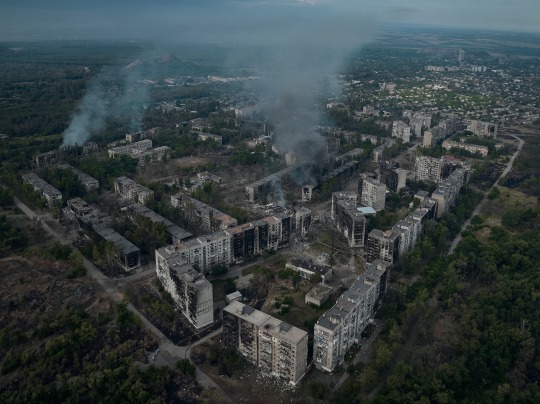
We are entering the city in two separate groups. I am with the military, and Vlada is with the legendary Ukrainian volunteer Denis Khrystov we have long wanted to meet, and his team.
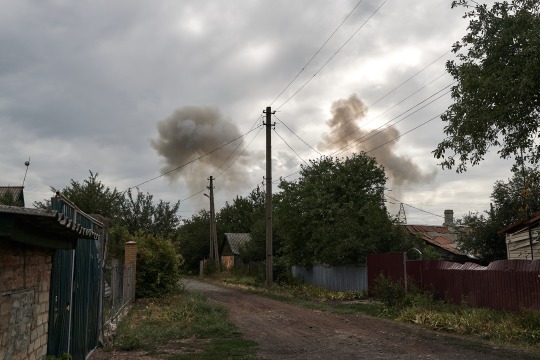
The city greets us with smog, making it hard to breathe. Toretsk is burning, every part of it. The city is scorched in entire blocks, and entering and moving around is a gamble because the artillery doesn’t cease, and KABs (guided bombs) hit the city almost every hour.
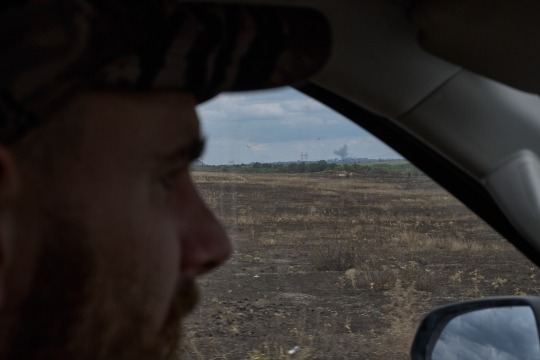
As we enter Toretsk, I see smoke rising from two such bombs. At that time, I don’t yet know that they fell just 150 meters from Vlada and Denis, who are gathering people and animals for evacuation.
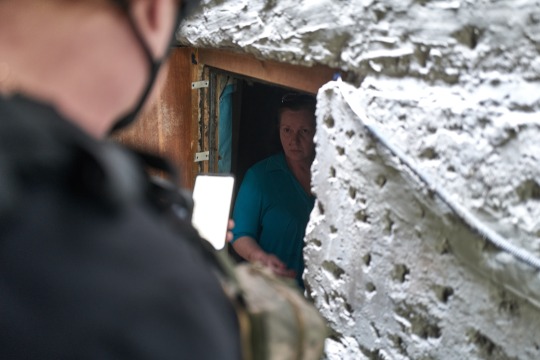
Many people want to leave, but there are also those who are afraid to go because they are disillusioned (the majority), as well as those who are obviously "waiting."
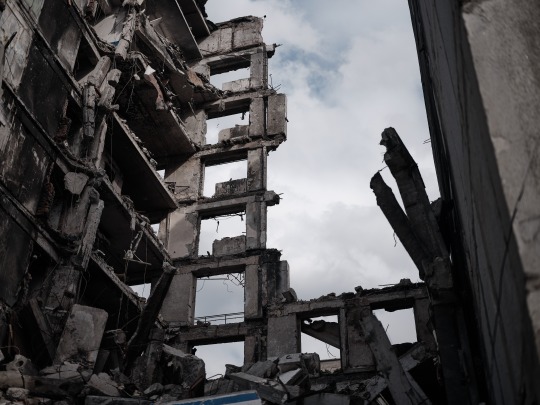
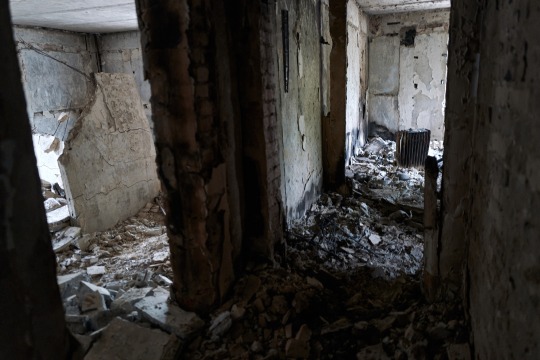
Both groups stay in the basements, as it is dangerous to come out, and besides, they have nowhere to go — their apartments and houses have long been destroyed by Russian artillery.
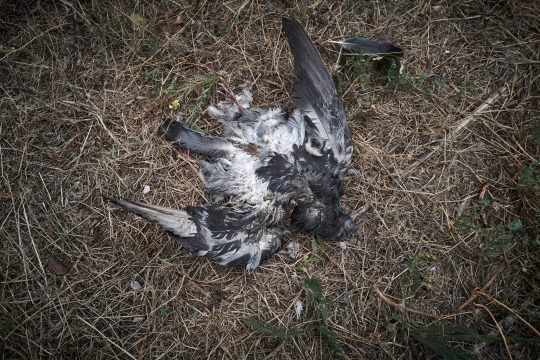
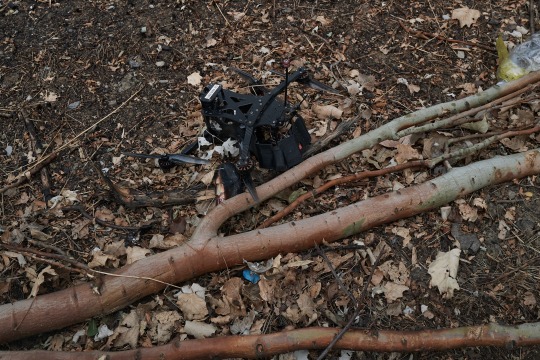
Now a bit about logistics and moving around the city. All the main streets of Toretsk are nearly 24/7 controlled by enemy FPV drones, creating so-called "roads of death,"
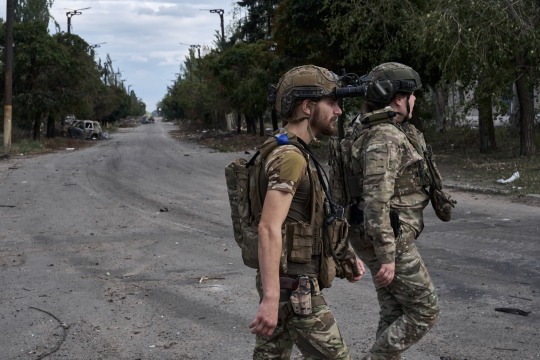
full of burned-out cars. Meanwhile, the parallel alleys and alternative routes through the yards are so destroyed by artillery that fallen trees and debris also almost make passage impossible.
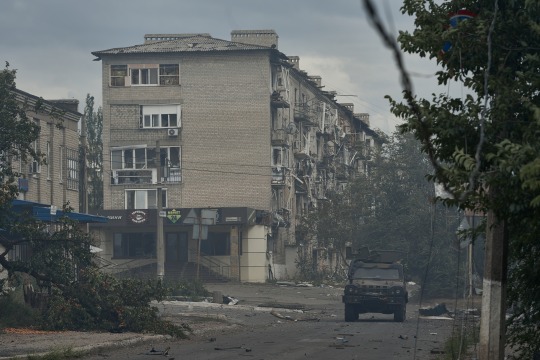
So you either risk losing a wheel by hitting a nail or shrapnel, or you must travel on the main arteries and hope that the electronic warfare (EW) will work.
Denis’s EW worked. It saved the life of the driver waiting for Denis and Vlada in the white evacuation van, but it could have cost Vlada dearly, who was just a meter from the impact and miraculously managed to run into a concrete bunker during the deadly dive.
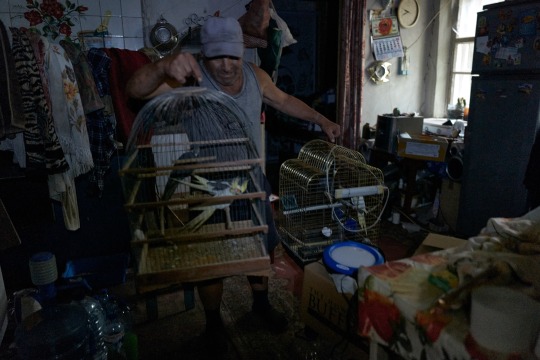
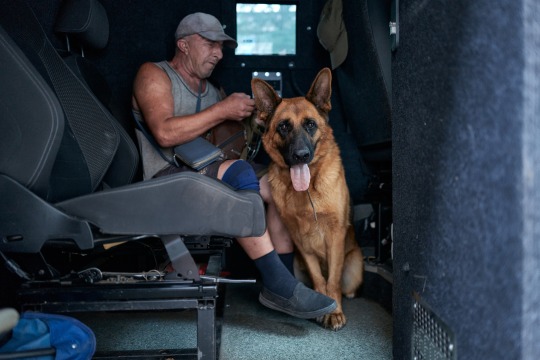
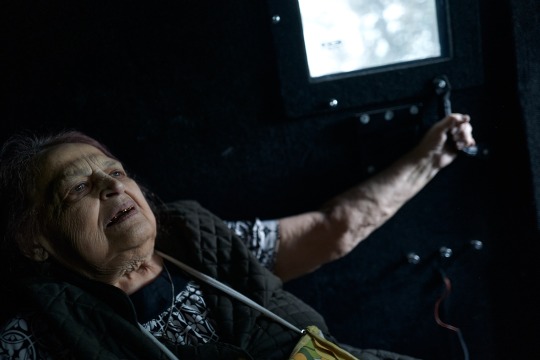
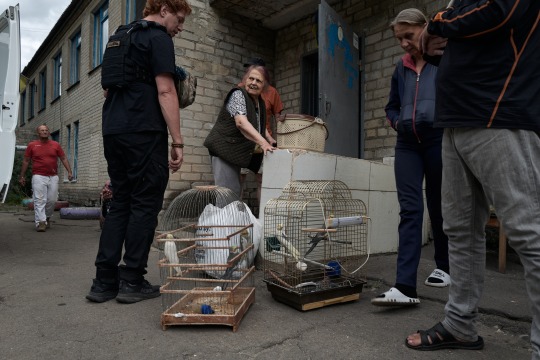
Toretsk has blackened and smells of death. Dead birds and animal remains are scattered along the deserted streets. According to Uncle Vitya, a local whom Denis’s group evacuated along with five parrots, two cats, and a shepherd dog named Bada
locals who die from the shelling are buried in their own yards, if they can be buried at all.
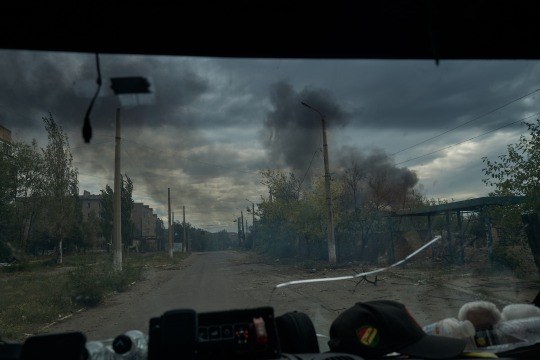
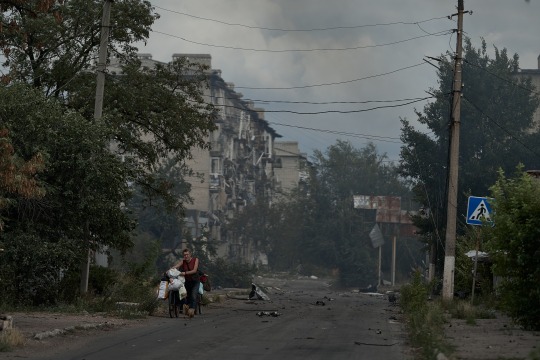
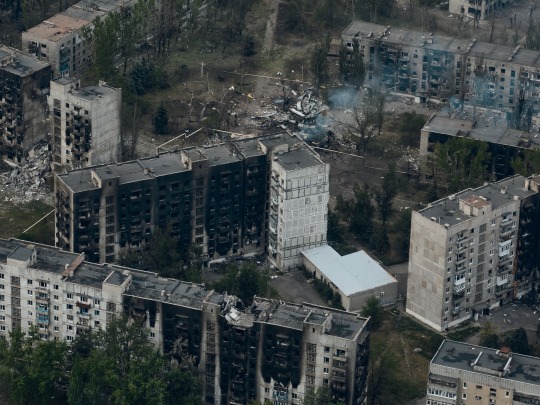
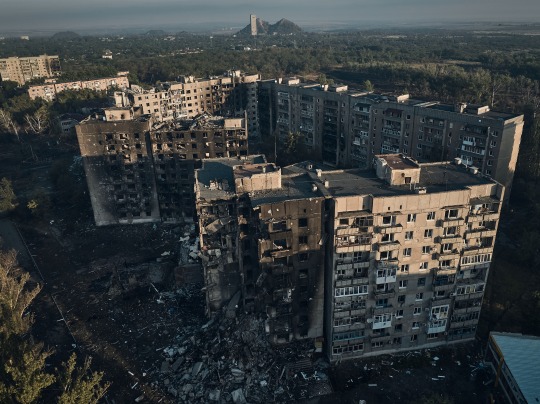
Our military holds the city, but it takes tremendous effort. In Ukraine, the word “hell” has long lost its sacred meaning: mythical hell is not frightening when you have seen the real one with your own eyes so many times.
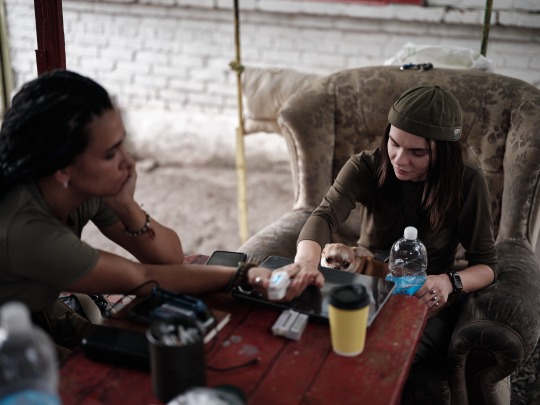
PS: Vlada received a small contusion from the explosion and still felt bad all night.
23 notes
·
View notes
Text
From FOX 2 Detroit - 'First Snow': State Police report 150 crashes across metro Detroit in the past 24 hours
'First Snow': State Police report 150 crashes across metro Detroit in the past 24 hours
Unsurprising, unfortunately. You would think in a state where it snows a good third of the year, people wouldn't forget how to do winter driving every freaking year. But then, and although I find myself saying "since covid", people's level of aptitude on the road has been in a steady and obvious year-after-year decline for some time.
People are way too distracted. You look at other cars, everybody is engaged with their screens. Social media and texting are not that urgent. The football man will still have won, and the cat will still be playing the piano when you reach your destination.
Also, people are way too impatient, riding everyone's bumpers so an unexpected tap of the brakes is almost a guaranteed ten car pileup.
You are navigating, give or take, two tons plus of steel at speeds the vast majority of humanity couldn't even fathom a hundred years ago. This is maybe something that one should be focused on, like more than a little bit?
My drive home yesterday was over a hundred miles of snowy bullshit, completely out of nowhere whiteouts, you're doing 65 or so, and then you're doing 20. With a lot of cars on the road, holiday travel and whatnot, and I-94 is a major truck route between Chicago and Detroit, so semis were abundant. It sucked... but it's not some kind of rocket science. Be patient. Your car will let you know if you're going too fast; you feel that little shimmy when you go over 48, OK, 48 is the speed.
Keep distance between you and the car in front of you. And above all else, read the road ahead of you. Like way ahead of you. I picked these skills up driving the salt truck; a 20,000 pound truck hauling 20,000 pounds of salt over snow and ice doesn't exactly stop on a dime. You start seeing brake lights well ahead, let off the gas. Start tapping your brakes, let the car behind you know what's up. Just focusing on the bumper in front of you, by the time they lock them up, you're already in trouble, and might get rear-ended if the car behind you isn't paying attention/can't react in time.
Shit can happen, accidents happen, sometimes, you're just in the wrong place at the wrong time. But then, there are clear and present accidents that were entirely avoidable were it not for human error. There's a reason the MSP started calling them "crashes" as opposed to "accidents". 🥔
15 notes
·
View notes
Text

US, Canadian Fighters Intercept Russian, Chinese Bombers Off Alaska
July 25, 2024 China, Russia
Five of the six fighters that escorted the Russian and Chinese bombers off Alaska are visible in this screenshot from the video released by the Russian MOD and published by Zvezda.
At least six NORAD fighters, including F-35, F-16 and CF-188 jets, intercepted Russian and Chinese bombers inside the Alaska ADIZ (Air Defense Identification Zone).
On July 24, 2024, NORAD (North American Aerospace Defense Command) detected, tracked, and intercepted two Russian Tu-95 and two Chinese H-6 aircraft operating within the Alaska Air Defense Identification Zone (ADIZ). The intercept was conducted by NORAD fighter jets from both the United States and Canada.
According to the Russian MOD, the Russian and Chinese bombers were involved in a joint air patrol lasting more than 5 hours:
“An air group consisting of Tu-95ms strategic missile carriers of the Russian Aerospace Forces and H-6K strategic bombers of the PLA Air Force carried out air patrols over the waters of the Chukchi, Bering Seas and the North Pacific Ocean,” a news release says.
“During the flight, Russian and Chinese crews worked out issues of interaction at all stages of air patrol in the new area of joint operations. Fighter air cover was provided by Su-30SM and Su-35S aircraft of the Russian Aerospace Forces.”

One of the Chinese H-6 bombers.
The mission of the Russian and Chinese bombers comes as the U.S. and allied forces are involved in RIMPAC 2024, a large exercise in the Pacific region near Hawaii, that this year sees the involvement of 29 nations, 40 surface ships, three submarines, 14 national land forces, over 150 aircraft, and 25,000 personnel.
Several interceptors
“At certain stages of the route, the air group was accompanied by fighters from foreign countries.”
In fact, footage filmed from aboard a Russian Tu-95 Bear show that at a certain point during their trip in international airspace within the Alaska ADIZ, the bomber was escorted by two F-16s of the 18th FIS (Fighter Interceptor Squadron), including one sporting the aggressor paint scheme; two U.S. F-35A stealth jets and two RCAF (Royal Canadian Air Force) CF-188 Hornets.
It is unclear whether all three pairs of fighters were scrambled to carry out a Visual Identification (VID) of the Russian and Chinese aircraft. Considering that at least one of the Canadian Hornets does not appear to be carrying any Air-to-Air Missiles (AAMs), it is possible that the two CF-188s were already airborne for a training mission and were then diverted to shadow the Tu-95s and H-6s.
For sure, the number of NORAD fighters visible in the clip released by the Russian MOD is unusual, if compared to other similar “close encounters” in the same area.
“During the execution of their missions, aircraft from both countries operated strictly in accordance with the provisions of international law. There were no violations of the airspace of foreign states,” the Ministry said. “Upon completion of the joint air patrol, all involved aircraft returned to their home airfields. The event was held as part of the implementation of the military cooperation plan for 2024 and is not directed against third countries.”

According to NORAD, the Russian and PRC aircraft stayed within international airspace and did not breach American or Canadian sovereign airspace. “This Russian and PRC activity in the Alaska ADIZ is not seen as a threat, and NORAD will continue to monitor competitor activity near North America and meet presence with presence.”

NORAD is a unique bi-national command between the United States and Canada. It utilizes a layered defense network composed of satellites, ground-based and airborne radars, and fighter aircraft, all operating seamlessly together to detect, track, and determine appropriate actions for aircraft. NORAD remains prepared to deploy various response options in defense of North America.
An ADIZ is a designated area of international airspace, extending beyond sovereign airspace, where the identification of all aircraft is required for national security purposes.
Air Defense Identification Zone
As explained in other articles, here at The Aviationist, there’s a significant difference between territorial sky and ADIZ.
The Air Defense Identification Zone (ADIZ) is a designated airspace surrounding a nation or part of it where strict identification, tracking, and control of aircraft are enforced for national security reasons. Aircraft flying within these zones without proper authorization may be intercepted by fighter aircraft on Quick Reaction Alert (QRA). ADIZ boundaries often extend beyond national airspace covering territorial waters, and while not defined by international law, any civil aircraft entering these zones is closely monitored and required to provide flight details for identification. Military aircraft not intending to enter national airspace are generally exempt from ADIZ procedures, but foreign military planes within ADIZ may be intercepted, identified, and escorted.
Alaska ADIZ detail

About David Cenciotti
David Cenciotti is a journalist based in Rome, Italy. He is the Founder and Editor of “The Aviationist”, one of the world’s most famous and read military aviation blogs. Since 1996, he has written for major worldwide magazines, including Air Forces Monthly, Combat Aircraft, and many others, covering aviation, defense, war, industry, intelligence, crime and cyberwar. He has reported from the U.S., Europe, Australia and Syria, and flown several combat planes with different air forces. He is a former 2nd Lt. of the Italian Air Force, a private pilot and a graduate in Computer Engineering. He has written five books and contributed to many more ones.
@TheAviationist.com
12 notes
·
View notes
Text
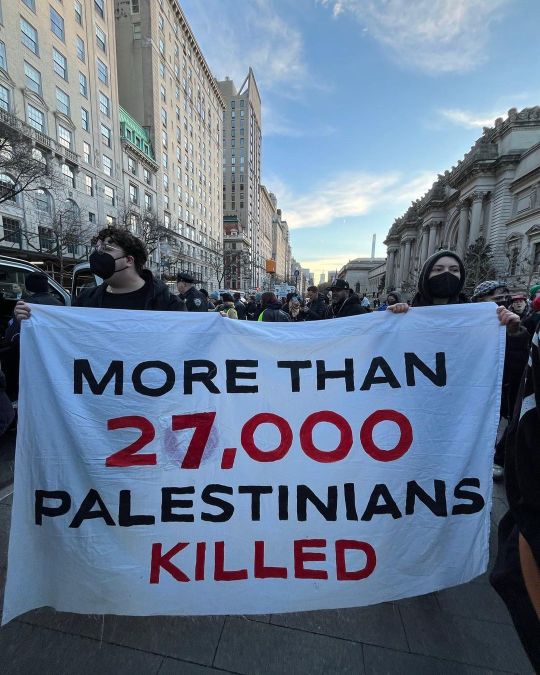
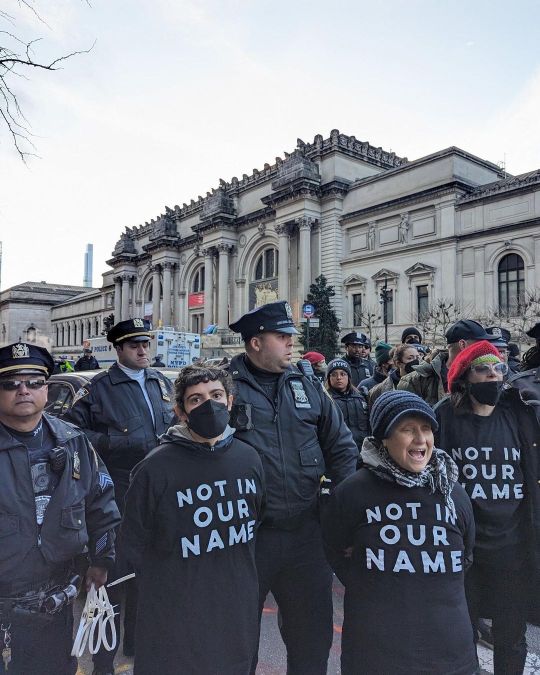
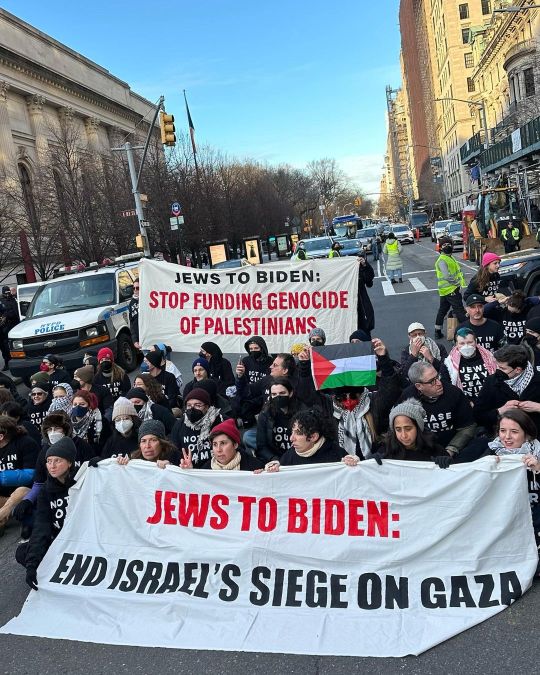
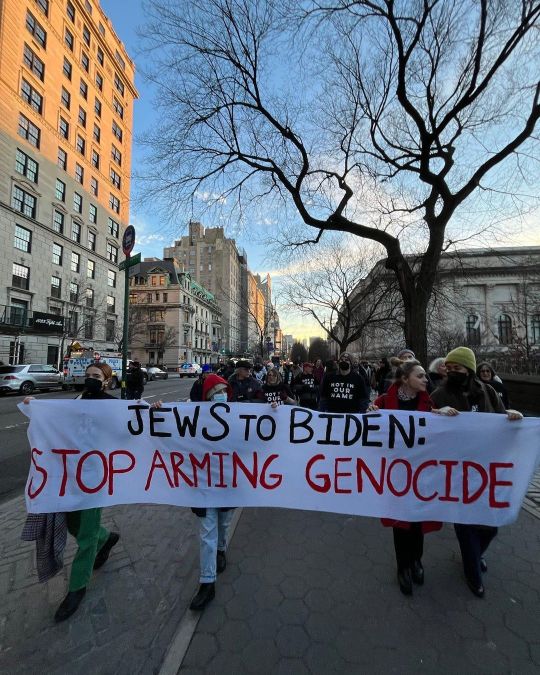
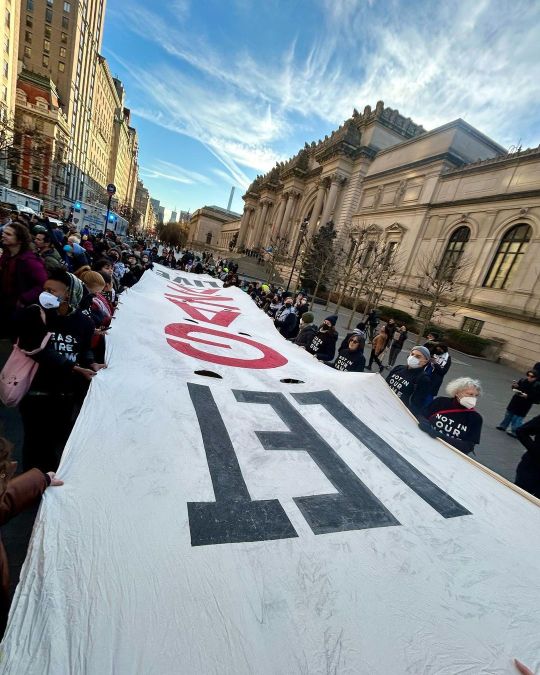

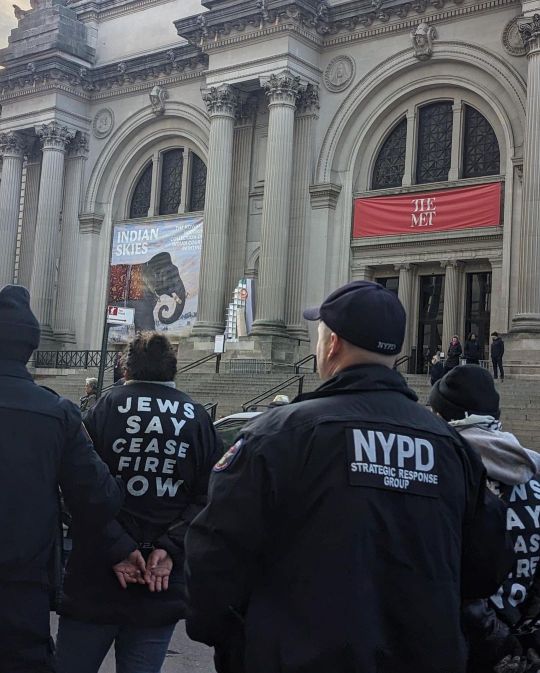
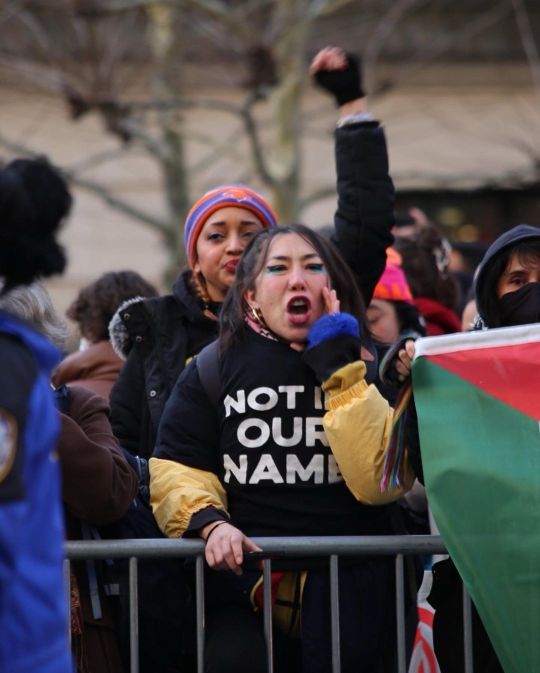
#Repost @jvpny
"Hundreds of anti-Zionist Jews blockading President Biden’s motorcade route as he travels to a campaign fundraiser on the Upper East Side, calling on the President — in his first New York City appearance since the crisis in Gaza began — to stop funding and arming the Israeli government’s genocide of Palestinians and ensure an immediate and permanent ceasefire.
As U.S. Jews and anti-Zionists, we want to make it crystal clear that President Biden is not welcome in our city while he continues to push additional funding and weapons for a genocide. Biden says he is doing this forJewish safety, but we call his bluff. The President is advancing the US’s own imperial interests. The price has been the lives of almost 30,000 Palestinians. Hundreds of thousands more are on the brink of famine.
There is no single person with more decision-making power over the US's funding, arming and backing of Israel's cataclysmic bombardment of Gaza than President Biden. Under his leadership, the United States has expedited $150 million of weapons sales to the Israeli military, ignored the World Court’s determination that Israel is plausibly committing genocide, suspended U.S. funding to UNRWA (the UN agency providing essential food and aid to Palestinians), and refused for months to call for an immediate and lasting ceasefire.
This is the first time President Biden has been in NYC since October 7th. And instead of answering to the majority of his base that has been imploring him for a ceasefire, he is pushing a deal for an additional $14.3 billion in military funding to Israel.
We refuse to just stand by while President Biden funds and arms a genocide. Today, thousands of New Yorkers took off work to demonstrate against him. And right now, hundreds of Jewish New Yorkers are getting arrested for blockading Fifth Avenue outside the Metropolitan Museum of Art, disrupting the Presidential motorcade route as it attempts to travel from one private fundraiser to another.
President Biden, answer to your constituents. Stop funding and arming the genocide of Palestinians in Gaza."
#CeasefireNow #LetGazaLive #NotInOurName
39 notes
·
View notes
Text
Aug. 5 (UPI) -- Bangladesh's embattled prime minister, Sheikh Hasina, resigned Monday and fled the country after protesters stormed her official residence in the capital amid a growing revolt that began over quotas for government jobs in which hundreds of mostly protesters have died.
The announcement from the head of the army, Gen. Waker-uz-Zaman, came after security forces were overwhelmed by thousands of people incensed by a violent government crackdown descending on the Sher-e-Bangla Nagar area of Dhaka, setting cars and offices ablaze.
Footage circulating online shows protesters celebrating inside Hasina's residence, removing furniture and elsewhere in the city trying to tear down a statue of her father, Sheikh Mujibur Rahman, former prime minister and leader of the country's independence movement, who was assassinated in 1975.
Promising the formation of an interim government, Zaman pleaded with demonstrators to call off their protests.
"Whatever demands you have, we will fulfil and bring back peace to the nation, please help us in this, stay away from violence," said Zaman who promised the military would also back off.
"The military will not fire at anyone, the police will not fire at anyone, I have given orders."
Hasina arrived by helicopter in India at a military airbase 17 miles east of Delhi on Monday evening with the BBC reporting that she may be en route to London, citing unconfirmed reports.
A spokesman for British Prime Minister Keir Starmer said Monday that he wanted to see urgent action to "ensure democracy" won out -- but made no mention of Hasina coming to Britain or any discussions regarding where she might go into exile.
"The right to peaceful protest must be protected and never subjected to violence, and we call on the authorities to release all peaceful protesters and ensure due process is followed for those charged and prosecuted," he added.
"I hope that swift action is taken to ensure that democracy prevails and accelerate the process towards peace and security to people in Bangladesh."
Hasina's son, Sajeeb Wazed Joy, said she had been considering resigning for the past 24 hours and had left the country for her own safety at the insistence of her family.
He rejected the accusations leveled at the 76-year-old of outstaying her welcome after four terms totaling more than two decades during which she gradually morphed from the democratic icon catapulted into office in a people power uprising into an authoritarian leader amid crackdowns on dissent and allegations of graft.
"She has turned Bangladesh around. When she took over power it was considered a failing state. It was a poor country. Until today it was considered one of the rising tigers of Asia. She's very disappointed."
In Dhaka, demonstrators ignored an evening curfew as unrest and looting continued into the night with demonstrators breaching the gates and damaging the residence of Home Minister Asaduzzaman Khan in the Dhanmondi area of the capital where smoke was seen coming from the building.
Protesters torched the city's Mujibur museum.
Northeast of Dhaka, 150 miles away in Sylhet, the offices of the deputy commissioner and superintendent of police and the homes of several councilors were attacked.
Hasina's resignation came a day after more than 90 people were killed Sunday during clashes between anti-government protesters and police -- 13 of whom were among those killed after thousands of people attacked a police station in the northwestern district of Sirajganj.
Sunday's casualties brought the death toll to 280 since early July when student protests over the partial reinstatement by the courts of civil service recruitment quotas -- where sought-after government jobs were reserved for supporters of Hasina's ruling Awami League -- erupted into wider, and violent, anti-government unrest.
Government crackdown efforts escalated from tear gas and rubber bullets to live fire, curfews and Internet blackouts bringing hundreds of thousands more people onto the streets demanding change and ultimately Hasina's resignation.
Student organizers had called Sunday for a national non-cooperation government boycott under which people would refuse to pay taxes and utility bills.
6 notes
·
View notes
Text
How Phloroglucinol 150 + Trimethylphloroglucinol 150 Suppositories Work in Treating Gastrointestinal Disorders
Gastrointestinal disorders affect millions of people worldwide, causing discomfort, pain, and disruption to daily life. Among the effective treatments for these conditions are phloroglucinol 150 + Trimethylphloroglucinol 150 suppositories, which have gained prominence for their antispasmodic properties. As a leading phloroglucinol 150 + trimethylphloroglucinol 150 suppository manufacturer in Senegal, Centurion Healthcare Pvt. Ltd. is proud to shed light on how these suppositories work and their role in managing gastrointestinal health.

Understanding Phloroglucinol and Trimethylphloroglucinol
Phloroglucinol and trimethylphloroglucinol are active ingredients widely used to relieve spasms in smooth muscles. Together, they form a potent combination that addresses various gastrointestinal issues by reducing spasmodic pain and improving patient comfort.
Key Properties of the Active Ingredients
Phloroglucinol: A spasmolytic agent that relaxes smooth muscles, especially in the gastrointestinal tract. It works by targeting hyperactive muscles, thus reducing contractions.
Trimethylphloroglucinol: A derivative of Phloroglucinol that enhances its efficacy and provides prolonged relief from spasms.
Mechanism of Action
The suppository form of Phloroglucinol 150 + Trimethylphloroglucinol allows for direct absorption into the bloodstream, offering faster relief compared to oral medications. Here is how it works:
Inhibits Muscle Spasms: The active ingredients block the calcium channels in smooth muscle cells, preventing excessive contractions.
Reduces Pain: By relaxing the muscles, the suppositories alleviate pain caused by cramping or spasms.
Targets Specific Disorders: Conditions like irritable bowel syndrome (IBS), colitis, and biliary colic benefit significantly from this treatment.
Applications of Phloroglucinol 150 + Trimethylphloroglucinol Suppositories
Irritable Bowel Syndrome (IBS): IBS is characterized by abdominal pain, bloating, and irregular bowel movements. The antispasmodic action of Phloroglucinol 150 + Trimethylphloroglucinol suppositories helps reduce abdominal discomfort and improve bowel function.
Renal and Biliary Colic: These conditions involve severe pain due to spasms in the urinary or biliary tract. The suppositories provide rapid relief by relaxing the affected smooth muscles.
Postoperative Spasms: Following abdominal surgeries, patients often experience spasms in the gastrointestinal tract. These suppositories are effective in minimizing such discomfort and speeding up recovery.
Why Choose Suppositories?
Suppositories offer several advantages over other forms of medication:
Rapid Absorption: The rectal route bypasses the digestive system, ensuring faster onset of action.
Minimized Side Effects: Unlike oral medications, suppositories reduce the risk of gastrointestinal irritation.
Convenience for Patients with Nausea: Patients unable to take oral medications due to vomiting or nausea benefit significantly from suppositories.
Centurion Healthcare Pvt. Ltd.: A Trusted Partner in Pharmaceuticals
Centurion Healthcare Pvt. Ltd. stands out as a leading name in the pharmaceutical industry in India, renowned for its commitment to quality and innovation. As one of the top pharmaceutical companies in India, we specialize in manufacturing and exporting high-quality medications, including Phloroglucinol 150 + Trimethylphloroglucinol 150 suppositories.
Our Expertise
Phloroglucinol 150 + trimethylphloroglucinol 150 suppository exporter in Senegal: We ensure timely delivery and adherence to international quality standards for our global clients.
State-of-the-Art Facilities: Our advanced manufacturing units adhere to stringent GMP guidelines, ensuring the highest quality products.
Comprehensive Solutions: From research and development to manufacturing and distribution, we cover every aspect of the pharmaceutical value chain.
The Role of Indian Pharma Companies in Global Healthcare
India has established itself as a global leader in the pharmaceutical sector, supplying affordable and high-quality medicines worldwide. Pharmaceutical companies in India, like Centurion Healthcare Pvt. Ltd., are at the forefront of this success story. Here is why:
Affordable Innovation: Indian pharma companies combine innovation with cost-efficiency, making medications accessible to millions.
Global Reach: As a prominent phloroglucinol 150 + trimethylphloroglucinol 150 suppository supplier in Senegal, we exemplify the international presence of Indian pharmaceuticals.
Diverse Product Range: From generics to specialized medications, Indian pharma manufacturing companies in India cater to diverse healthcare needs.
Challenges in Gastrointestinal Health and the Need for Effective Solutions
Gastrointestinal disorders are on the rise globally due to factors like poor diet, stress, and sedentary lifestyles. These conditions require effective and targeted treatments to improve patient quality of life. Phloroglucinol 150 + Trimethylphloroglucinol suppositories address this need by:
Providing Quick Relief: Their rapid absorption ensures faster alleviation of symptoms.
Enhancing Patient Compliance: Easy-to-administer and effective, these suppositories are a preferred choice for many patients.
Reducing Healthcare Costs: By preventing complications and hospitalizations, they offer cost-effective solutions for gastrointestinal care.
Centurion Healthcare Pvt. Ltd.: A Leader among Pharmaceutical Companies
As one of the top 10 pharmaceutical companies in India, Centurion Healthcare Pvt. Ltd. is dedicated to improving global healthcare through innovative products. Our pharma companies in India are known for their commitment to excellence, making us a trusted partner for healthcare providers and patients alike.
Why Partner with Us?
Global Expertise: We have a strong presence in international markets, including Senegal, where we are recognized as a leading phloroglucinol 150 + trimethylphloroglucinol 150 suppository manufacturer in Senegal.
Quality Assurance: Our products undergo rigorous quality checks to meet the highest standards.
Customer-Centric Approach: We prioritize the needs of our clients and patients, ensuring effective and reliable solutions.
The Future of Gastrointestinal Treatment
The pharmaceutical industry is constantly evolving, with new advancements shaping the future of healthcare. As a leader in the pharmaceutical industry in India, Centurion Healthcare Pvt. Ltd. is committed to staying at the forefront of innovation.
Key Trends to Watch:
Personalized Medicine: Tailored treatments based on individual patient needs.
Advanced Drug Delivery Systems: Innovations like sustained-release formulations and targeted therapies.
Global Collaboration: Strengthening ties between Indian pharma companies and international healthcare providers.
Conclusion
Phloroglucinol 150 + Trimethylphloroglucinol 150 suppositories represent a significant advancement in the treatment of gastrointestinal disorders. Their effectiveness in relieving spasms and improving patient outcomes makes them a vital tool in modern healthcare.
As a trusted phloroglucinol 150 + trimethylphloroglucinol 150 suppository exporter in Senegal and one of the top pharmaceutical companies in India, Centurion Healthcare Pvt. Ltd. is proud to contribute to global health through high-quality products. Partner with us to access reliable and innovative solutions for your healthcare needs.
#Pharma manufacturing companies in India#Pharmaceutical companies in India#Pharma companies in India#Phloroglucinol 150 +trimethylphloroglucinol 150 suppository manufacturer#Phloroglucinol 150 +trimethylphloroglucinol 150 suppository exporter#Phloroglucinol 150 +trimethylphloroglucinol 150 suppository supplier#Top pharmaceutical companies in India#Top 10 pharmaceutical companies in India
3 notes
·
View notes
Text
This June, approximately 150 motorcycles will thunder down Route 9W in Saugerties, New York, for Ryan’s Ride for Recovery. Organized by Vince Kelder and his family, the barbecue and raffle will raise money to support their sober-living facility and honor their son who tragically died from a heroin overdose in 2015 after a years-long drug addiction.
The Kelders established Raising Your Awareness about Narcotics (RYAN) to help others struggling with substance-use disorder. For years, the organization has relied on Eventbrite, an event management and ticketing website, to arrange its events. This year, however, alongside listings for Ryan’s Ride and other addiction recovery events, Eventbrite surfaced listings peddling illegal sales of prescription drugs like Xanax, Valium, and oxycodone.
“It’s criminal,” Vince Kelder says. “They’re preying on people trying to get their lives back together.”
Eventbrite prohibits listings dedicated to selling illegal substances on its platform. It’s one of the 16 categories of content the company’s policies restrict its users from posting. But a WIRED investigation found more than 7,400 events published on the platform that appeared to violate one or more of these terms.
Among these listings were pages claiming to sell fentanyl powder “without a prescription,” accounts pushing the sale of Social Security numbers, and pages offering a “wild night with independent escorts” in India. Some linked to sites offering such wares as Gmail accounts, Google reviews (positive and negative), and TikTok and Instagram likes and followers, among other services.
At least 64 of the event listings advertising drugs included links to online pharmacies that the National Association of Boards of Pharmacy have flagged as untrustworthy or unsafe. Amanda Hils, a spokesperson for the US Food and Drug Administration, says the agency does not comment on individual cases without a thorough review, but broadly some online pharmacies that appear to look legitimate may be “operating illegally and selling medicines that can be dangerous or even deadly.”
Eventbrite didn’t just publish these user-generated event listings; its algorithms appeared to actively recommend them to people through simple search queries or in “related events”—a section at the bottom of an event’s page showing users similar events they might be interested in. As well as posts selling illegal prescription drugs in search results appearing next to the RYAN event, a search for “opioid” in the United States showed Eventbrite’s recommendation algorithm suggesting a conference for opioid treatment practitioners between two listings for ordering oxycodone.
Robin Pugh, the executive director of nonprofit cybercrime fighting organization Intelligence for Good, which first alerted WIRED to some of the listings, says it is quick and easy to identify the illicit posts on Eventbrite and that other websites that allow “user-generated content” are also plagued by scammers uploading posts in similar ways.
“I’m confident Eventbrite does not want to be hosting this on their platform—I’m pretty sure that that is not what they had in mind,” Pugh says. “It shows that a lot of the platforms that haven’t traditionally thought of themselves as being part of the threatscape have no idea how to monitor the content on their platform.”
“Listings like these do not have a home on Eventbrite,” Chris Adams, the company’s head of platform product, tells WIRED in a statement. “This is a spam attack, coordinated by a few bad actors attempting to draw audiences to third-party sites.” Adams says Eventbrite is taking the issue “very seriously” and the “identified illegal and illicit activity has been removed.”
Eventbrite’s help center says it uses a “combination of tools and processes” to detect content that goes against its rules. These include, its pages say, using machine learning to proactively detect content, a “rules-based” system, responding to reports from users, and human reviews.
“Our investigation determined this is abnormal activity, a misuse of the Eventbrite platform, and based on our findings, Eventbrite did not profit from these listings, and there have been no finalized ticket purchases identified,” Adams says.
Eventbrite appears to have removed most, if not all, of the illicit listings that WIRED identified after we alerted the company to the issue. Because of the way WIRED collected the data, however, the thousands of listings found on Eventbrite are likely the tip of the iceberg. WIRED obtained the data used for its analysis by collecting listings Eventbrite deemed were “related” to hundreds of events found through simple keyword searches. These keyword searches and their related events likely do not capture the entirety of illicit events published on the platform.
Even within this limited dataset, our analysis found that, on average, 169 illicit events have been published daily.
The vast majority of the listings WIRED found used common tactics, whether they pushed drugs, escort services, or online account details. The spammy pages were often listed as online “events.” The events do not actually happen but rather act as a way for those posting them to publish their activities online. Most of them were free; however, some tried to charge people to “attend” through Eventbrite. It is not clear whether anyone has paid for any of the events.
Searching for various controlled substances, such as brand-name opioids, brought up results on Eventbrite. These “events” mostly pushed people away from the platform to online pharmacy websites, which say people can buy medicines without prescriptions.
John Hertig, an associate professor at Butler University College of Pharmacy and Health Sciences, says there are thousands of online pharmacies operating at any time and that the vast majority of them are illegal��with websites often selling drugs not approved by the FDA or failing to be licensed in the country where they are selling into.
“The other major issue that we see in terms of illegality is not requiring a prescription,” Hertig says. “You see a lot of this: ‘easy, hassle free, simple process, no doctor needed.’ That's illegal.” Typically accounts claiming to sell medicines through non-official platforms, such as those on Eventbrite, will not be doing so legitimately, Hertig says, and that brings risks around whether what they are selling is safe.
As well as websites, those claiming to sell illicit services on Eventbrite pushed people to chat privately on WhatsApp or Telegram. Our analysis identified as many as 60 unique Telegram accounts and 65 WhatsApp numbers in the dataset. WhatsApp spokesperson Joshua Breckman says the platform encourages users to report suspicious activity and that it will respond to valid law enforcement requests. Telegram did not respond to a request for comment.
“I use Eventbrite to show people what services I sell,” the person behind one account, going by the username Usa Best Vcc, tells WIRED in a Telegram chat. “Eventbrite helps 100% in getting my services to people.” The account, which claims to sell social media accounts and banking accounts and lists more than a dozen apps, has had its Telegram handle listed on more than 200 Eventbrite pages, according to search engine results. It also has its own website, Gmail address, Skype, and WhatsApp accounts.
Similarly, one Indian WhatsApp number appeared on 123 almost identical listings on Eventbrite. The telephone number is linked to two other numbers and a website that appears to offer escort services. All three numbers replied to messages and asked what “area” or “location” a WIRED reporter was in. One number sent a series of photographs of women and a proposed list of prices for their services.
Those behind the accounts posting to Eventbrite likely have not just singled out the platform; many also have presences across other websites and services where people can upload their own content. They often include short summaries, which are filled with keywords that could help them appear higher in search results.
For instance, the Usa Best Vcc seller also has posts on Pinterest, Medium, Deviant Art, and more. The Indian WhatsApp number also appears on hiking website AllTrails, an open data website from Public Health Scotland, Medium, and others. Pinterest spokesperson Ivy Choi says the company deleted the account and works quickly to remove content that violates its policies when it detects them. AllTrails declined to comment, and other organizations did not respond to a request for comment.
“Any site that allows a user to upload their own content will find these cyber criminals advertising, scamming, or using the site for their personal gain,” says Rachel Tobac, the cofounder and CEO of SocialProof security. “Cybercriminals leverage the power of user-generated content (their own drug advertisement) to sell to folks who are searching for what they have to sell.”
Pugh, from Intelligence for Good, says those uploading the posts to multiple platforms may be using automated tools to do so, and they are not manually entering all their details time and time again. “You definitely can see a difference in some of the more sophisticated actors who have clearly used some SEO-manipulation tools,” Pugh says. Some, she says, will use emoji or slang terms to avoid automatic content moderation that platforms put in place.
“Any platform that is inviting their user community to host freely has to be aware that their platform can be used for reasons that were never intended,” Pugh adds. “If you're putting a platform out there and inviting the community to participate, you have a responsibility to keep it safe.”
4 notes
·
View notes
Text

Airbus A220-300 Breeze Airways
Registration: N223BZ Type: A220-371 Engines: 2 × PW PW1521G-3 Serial Number: 55209 First flight: Jun 8, 2023
Breeze Airways is an American low-cost airline headquartered in Cottonwood Heights, Utah. Originally code-named "Moxy", the airline was later named "Breeze Airways" in February of 2020. Operations launched on May 27, 2021 with it's inaugural flight from Tampa International Airport. In the initial years following launch, the airline's network expanded to consist of 150 domestic short-haul and transcontinental routes within the United States, as well as charter operations. During 2023, the airline began processes to operate international flights to Mexico. The airline's first Airbus A220-300 was delivered on October 26, 2021 and has a total of 120 aircraft on order.
Poster for Aviators. aviaposter.com
#civilaircraft#airliner#aviationgeek#airbuspilot#airbusfan#a220#aviation#avgeek#airliners#gift for pilot
4 notes
·
View notes
Text
Hamas rapes on 7th October
By Jeffrey Gettleman, Anat Schwartz and Adam Sella
Photographs by Avishag Shaar-Yashuv
Jeffrey Gettleman, Anat Schwartz and Adam Sella reported from across Israel and interviewed more than 150 people.
Dec. 28, 2023 Updated 1:23 p.m. ET
At first, she was known simply as “the woman in the black dress.”
In a grainy video, you can see her, lying on her back, dress torn, legs spread, vagina exposed. Her face is burned beyond recognition and her right hand covers her eyes.
The video was shot in the early hours of Oct. 8 by a woman searching for a missing friend at the site of the rave in southern Israel where, the day before, Hamas terrorists massacred hundreds of young Israelis.
The video went viral, with thousands of people responding, desperate to know if the woman in the black dress was their missing friend, sister or daughter.
One family knew exactly who she was — Gal Abdush, mother of two from a working-class town in central Israel, who disappeared from the rave that night with her husband.
As the terrorists closed in on her, trapped on a highway in a line of cars of people trying to flee the party, she sent one final WhatsApp message to her family: “You don’t understand.”
Based largely on the video evidence — which was verified by The New York Times — Israeli police officials said they believed that Ms. Abdush was raped, and she has become a symbol of the horrors visited upon Israeli women and girls during the Oct. 7 attacks.
Israeli officials say that everywhere Hamas terrorists struck — the rave, the military bases along the Gaza border and the kibbutzim — they brutalized women.
A two-month investigation by The Times uncovered painful new details, establishing that the attacks against women were not isolated events but part of a broader pattern of gender-based violence on Oct. 7.
Relying on video footage, photographs, GPS data from mobile phones and interviews with more than 150 people, including witnesses, medical personnel, soldiers and rape counselors, The Times identified at least seven locations where Israeli women and girls appear to have been sexually assaulted or mutilated.
Four witnesses described in graphic detail seeing women raped and killed at two different places along Route 232, the same highway where Ms. Abdush’s half-naked body was found sprawled on the road at a third location.
And The Times interviewed several soldiers and volunteer medics who together described finding more than 30 bodies of women and girls in and around the rave site and in two kibbutzim in a similar state as Ms. Abdush’s — legs spread, clothes torn off, signs of abuse in their genital areas.
Many of the accounts are difficult to bear, and the visual evidence is disturbing to see.
The Times viewed photographs of one woman’s corpse that emergency responders discovered in the rubble of a besieged kibbutz with dozens of nails driven into her thighs and groin.
The Times also viewed a video, provided by the Israeli military, showing two dead Israeli soldiers at a base near Gaza who appeared to have been shot directly in their vaginas.
Hamas has denied Israel’s accusations of sexual violence. Israeli activists have been outraged that the United Nations Secretary General, António Guterres, and the agency U.N. Women did not acknowledge the many accusations until weeks after the attacks.
Investigators with Israel’s top national police unit, Lahav 433, have been steadily gathering evidence but they have not put a number on how many women were raped, saying that most are dead — and buried — and that they will never know. No survivors have spoken publicly.
The Israeli police have acknowledged that, during the shock and confusion of Oct. 7, the deadliest day in Israeli history, they were not focused on collecting semen samples from women’s bodies, requesting autopsies or closely examining crime scenes. At that moment, the authorities said, they were intent on repelling Hamas and identifying the dead.
A combination of chaos, enormous grief and Jewish religious duties meant that many bodies were buried as quickly as possible. Most were never examined, and in some cases, like at the rave scene, where more than 360 people were slaughtered in a few hours, the bodies were hauled away by the truckload.
That has left the Israeli authorities at a loss to fully explain to families what happened to their loved ones in their final moments. Ms. Abdush’s relatives, for instance, never received a death certificate. They are still searching for answers.
In cases of widespread sexual violence during a war, it is not unusual to have limited forensic evidence, experts said.
“Armed conflict is so chaotic,” said Adil Haque, a Rutgers law professor and war crimes expert. “People are more focused on their safety than on building a criminal case down the road.”
Very often, he said, sex crime cases will be prosecuted years later on the basis of testimony from victims and witnesses.
“The eyewitness might not even know the name of the victim,” he added. “But if they can testify as, ‘I saw a woman being raped by this armed group,’ that can be enough.”
‘Screams without words’
Sapir, a 24-year-old accountant, has become one of the Israeli police’s key witnesses. She does not want to be fully identified, saying she would be hounded for the rest of her life if her last name were revealed.
She attended the rave with several friends and provided investigators with graphic testimony. She also spoke to The Times. In a two-hour interview outside a cafe in southern Israel, she recounted seeing groups of heavily armed gunmen rape and kill at least five women.
She said that at 8 a.m. on Oct. 7, she was hiding under the low branches of a bushy tamarisk tree, just off Route 232, about four miles southwest of the party. She had been shot in the back. She felt faint. She covered herself in dry grass and lay as still as she could.
About 15 meters from her hiding place, she said, she saw motorcycles, cars and trucks pulling up. She said that she saw “about 100 men,” most of them dressed in military fatigues and combat boots, a few in dark sweatsuits, getting in and out of the vehicles. She said the men congregated along the road and passed between them assault rifles, grenades, small missiles — and badly wounded women.
“It was like an assembly point,” she said.
The first victim she said she saw was a young woman with copper-color hair, blood running down her back, pants pushed down to her knees. One man pulled her by the hair and made her bend over. Another penetrated her, Sapir said, and every time she flinched, he plunged a knife into her back.
She said she then watched another woman “shredded into pieces.” While one terrorist raped her, she said, another pulled out a box cutter and sliced off her breast.
“One continues to rape her, and the other throws her breast to someone else, and they play with it, throw it, and it falls on the road,” Sapir said.
She said the men sliced her face and then the woman fell out of view. Around the same time, she said, she saw three other women raped and terrorists carrying the severed heads of three more women.
Sapir provided photographs of her hiding place and her wounds, and police officials have stood by her testimony and released a video of her, with her face blurred, recounting some of what she saw.
Yura Karol, a 22-year-old security consultant, said he was hiding in the same spot, and he can be seen in one of Sapir’s photos. He and Sapir were part of a group of friends who had met up at the party. In an interview, Mr. Karol said he barely lifted his head to look at the road but he also described seeing a woman raped and killed.
Since that day, Sapir said, she has struggled with a painful rash that spread across her torso, and she can barely sleep, waking up at night, heart pounding, covered in sweat.
“That day, I became an animal,” she said. “I was emotionally detached, sharp, just the adrenaline of survival. I looked at all this as if I was photographing them with my eyes, not forgetting any detail. I told myself: I should remember everything.”
That same morning, along Route 232 but in a different location about a mile southwest of the party area, Raz Cohen — a young Israeli who had also attended the rave and had worked recently in the Democratic Republic of Congo training Congolese soldiers — said that he was hiding in a dried-up streambed. It provided some cover from the assailants combing the area and shooting anyone they found, he said in an hour-and-a-half interview in a Tel Aviv restaurant.
Maybe 40 yards in front of him, he recalled, a white van pulled up and its doors flew open.
He said he then saw five men, wearing civilian clothes, all carrying knives and one carrying a hammer, dragging a woman across the ground. She was young, naked and screaming.
“They all gather around her,” Mr. Cohen said. “She’s standing up. They start raping her. I saw the men standing in a half circle around her. One penetrates her. She screams. I still remember her voice, screams without words.”
“Then one of them raises a knife,” he said, “and they just slaughtered her.”
Shoam Gueta, one of Mr. Cohen’s friends and a fashion designer, said the two were hiding together in the streambed. He said he saw at least four men step out of the van and attack the woman, who ended up “between their legs.” He said that they were “talking, giggling and shouting,” and that one of them stabbed her with a knife repeatedly, “literally butchering her.”
Hours later, the first wave of volunteer emergency medical technicians arrived at the rave site. In interviews, four of them said that they discovered bodies of dead women with their legs spread and underwear missing — some with their hands tied by rope and zipties — in the party area, along the road, in the parking area and in the open fields around the rave site.
Jamal Waraki, a volunteer medic with the nonprofit ZAKA emergency response team, said he could not get out of his head a young woman in a rawhide vest found between the main stage and the bar.
“Her hands were tied behind her back,” he said. “She was bent over, half naked, her underwear rolled down below her knees.”
Yinon Rivlin, a member of the rave’s production team who lost two brothers in the attacks, said that after hiding from the killers, he emerged from a ditch and made his way to the parking area, east of the party, along Route 232, looking for survivors.
Near the highway, he said, he found the body of a young woman, on her stomach, no pants or underwear, legs spread apart. He said her vagina area appeared to have been sliced open, “as if someone tore her apart.”
Similar discoveries were made in two kibbutzim, Be’eri and Kfar Aza. Eight volunteer medics and two Israeli soldiers told The Times that in at least six different houses, they had come across a total of at least 24 bodies of women and girls naked or half naked, some mutilated, others tied up, and often alone.
A paramedic in an Israeli commando unit said that he had found the bodies of two teenage girls in a room in Be’eri.
One was lying on her side, he said, boxer shorts ripped, bruises by her groin. The other was sprawled on the floor face down, he said, pajama pants pulled to her knees, bottom exposed, semen smeared on her back.
Because his job was to look for survivors, he said, he kept moving and did not document the scene. Neighbors of the two girls killed — who were sisters, 13 and 16 — said their bodies had been found alone, separated from the rest of their family.
The Israeli military allowed the paramedic to speak with reporters on the condition that he not be identified because he serves in an elite unit.
Many of the dead were brought to the Shura military base, in central Israel, for identification. Here, too, witnesses said they saw signs of sexual violence.
Shari Mendes, an architect called up as a reserve soldier to help prepare the bodies of female soldiers for burial, said she had seen four with signs of sexual violence, including some with “a lot of blood in their pelvic areas.”
A dentist, Captain Maayan, who worked at the same identification center, said that she had seen at least 10 bodies of female soldiers from Gaza observation posts with signs of sexual violence.
Captain Maayan asked to be identified only by her rank and surname because of the sensitivity of the subject. She said she had seen several bodies with cuts in their vaginas and underwear soaked in blood and one whose fingernails had been pulled out.
The investigation
The Israeli authorities have no shortage of video evidence from the Oct. 7 attacks. They have gathered hours of footage from Hamas body cameras, dashcams, security cameras and mobile phones showing Hamas terrorists killing civilians and many images of mutilated bodies.
But Moshe Fintzy, a deputy superintendent and senior spokesman of Israel’s national police, said, “We have zero autopsies, zero,” making an O with his right hand.
In the aftermath of the attack, police officials said, forensic examiners were dispatched to the Shura military base to help identify the hundreds of bodies — Israeli officials say around 1,200 people were killed that day.
The examiners worked quickly to give the agonized families of the missing a sense of closure and to determine, by a process of elimination, who was dead and who was being held hostage in Gaza.
According to Jewish tradition, funerals are held promptly. The result was that many bodies with signs of sexual abuse were put to rest without medical examinations, meaning that potential evidence now lies buried in the ground. International forensic experts said that it would be possible to recover some evidence from the corpses, but that it would be difficult.
Mr. Fintzy said Israeli security forces were still finding imagery that shows women were brutalized. Sitting at his desk at an imposing police building in Jerusalem, he swiped open his phone, tapped and produced the video of the two soldiers shot in the vagina, which he said was recorded by Hamas gunmen and recently recovered by Israeli soldiers.
A colleague sitting next to him, Mirit Ben Mayor, a police chief superintendent, said she believed that the brutality against women was a combination of two ferocious forces, “the hatred for Jews and the hatred for women.”
Some emergency medical workers now wish they had documented more of what they saw. In interviews, they said they had moved bodies, cut off zip ties and cleaned up scenes of carnage. Trying to be respectful to the dead, they inadvertently destroyed evidence.
Many volunteers working for ZAKA, the emergency response team, are religious Jews and operate under strict rules that command deep respect for the dead.
“I did not take pictures because we are not allowed to take pictures,” said Yossi Landau, a ZAKA volunteer. “In retrospect, I regret it.”
There are at least three women and one man who were sexually assaulted and survived, according to Gil Horev, a spokesman for Israel’s Ministry of Welfare and Social Affairs. “None of them has been willing to come physically for treatment,” he said. Two therapists said they were working with a woman who was gang raped at the rave and was in no condition to talk to investigators or reporters.
The trauma from sexual assault can be so heavy that sometimes survivors do not speak about it for years, several rape counselors said.
“Many people are looking for the golden evidence, of a woman who will testify about what happened to her. But don’t look for that, don’t put this pressure on this woman,” said Orit Sulitzeanu, executive director of the Association of Rape Crisis Centers in Israel. “The corpses tell the story.”
The woman in the black dress
One of the last images of Ms. Abdush alive — captured by a security camera mounted on her front door — shows her leaving home with her husband, Nagi, at 2:30 a.m. on Oct. 7 for the rave.
He was wearing jeans and a black T-shirt. She was dressed in a short black dress, a black shawl tied around her waist and combat boots. As she struts out, she takes a swig from a glass (her brother-in-law remembers it was Red Bull and vodka) and laughs.
You’ve got to live life like it’s your last moments. That was her motto, her sisters said.
At daybreak, hundreds of terrorists closed in on the party from several directions, blocking the highways leading out. The couple jumped into their Audi, dashing off a string of messages as they moved.
“We’re on the border,” Ms. Abdush wrote to her family. “We’re leaving.”
“Explosions.”
Her husband made his own calls to his family, leaving a final audio message for his brother, Nissim, at 7:44 a.m. “Take care of the kids,” he said. “I love you.”
Gunshots rang out, and the message stopped.
That night, Eden Wessely, a car mechanic, drove to the rave site with three friends and found Ms. Abdush sprawled half naked on the road next to her burned car, about nine miles north of the site. She did not see the body of Mr. Abdush.
She saw other burned cars and other bodies, and shot videos of several — hoping that they would help people to identify missing relatives. When she posted the video of the woman in the black dress on her Instagram story, she was deluged with messages.
“Hi, based on your description of the woman in the black dress, did she have blonde hair?” one message read.
“Eden, the woman you described with the black dress, do you remember the color of her eyes?” another said.
Some members of the Abdush family saw that video and another version of it filmed by one of Ms. Wessely’s friends. They immediately suspected that the body was Ms. Abdush, and based on the way her body was found, they feared that she might have been raped.
But they kept alive a flicker of hope that somehow, it wasn’t true.
The videos caught the eye of Israeli officials as well — very quickly after Oct. 7 they began gathering evidence of atrocities. They included footage of Ms. Abdush’s body in a presentation made to foreign governments and media organizations, using Ms. Abdush as a representation of violence committed against women that day.
A week after her body was found, three government social workers appeared at the gate of the family’s home in Kiryat Ekron, a small town in central Israel. They broke the news that Ms. Abdush, 34, had been found dead.
But the only document the family received was a one-page form letter from Israel’s president, Isaac Herzog, expressing his condolences and sending a hug. The body of Mr. Abdush, 35, was identified two days after his wife’s. It was badly burned and investigators determined who he was based on a DNA sample and his wedding ring.
The couple had been together since they were teenagers. To the family, it seems only yesterday that Mr. Abdush was heading off to work to fix water heaters, a bag of tools slung over his shoulder, and Ms. Abdush was cooking up mashed potatoes and schnitzel for their two sons, Eliav, 10, and Refael, 7.
The boys are now orphans. They were sleeping over at an aunt’s the night their parents were killed. Ms. Abdush’s mother and father have applied for permanent custody, and everyone is chipping in to help.
Night after night, Ms. Abdush’s mother, Eti Bracha, lies in bed with the boys until they drift off. A few weeks ago, she said she tried to quietly leave their bedroom when the younger boy stopped her.
“Grandma,” he said, “I want to ask you a question.”
“Honey,” she said, “you can ask anything.”
“Grandma, how did mom die?”
17 notes
·
View notes
Text

🇵🇸🇮🇱🚨 UPDATE ON THE OVERNIGHT EVENTS OF THE GAZA WAR
• Iraqi Resistance announces to have targeted the US occupation of the Khareb al-Jeer military base in Northeastern Syria
• Honduras recalls its ambassador to Israel
• US protestors in Oakland attempt to block US ships loaded with military equipment and ammunition bound for occupied Palestine
• Iraqi Resistance claims responsibility for two drone strikes on the US Harir Military base located in Iraqi Kurdistan.
• According to the authorities in Gaza, 46 journalists have been killed in the latest round of Israeli ethnic cleansing of the Palestinian population in the Gaza Strip.
• US Officials expect the Israeli Occupation Forces to move towards infantry and ground operations over the heavy bombing and shelling of residential neighborhoods in Gaza according to a CNN report
• Multiple killed and wounded in an Israeli strike on the entrance to the al-Nasr children's hospital in western Gaza
• 25 ambulances have been destroyed by Israeli Occupation Forces since October 7th
• Iraqi Resistance Forces targeted a US military base in al-Shaddadi, Syria
• Israeli Occupation Forces launched air strikes targeting the Al-Fakhoura school in the northern Gaza Strip where refugees were sheltering
• Israeli Occupation Forces have deliberately targeted 105 healthcare centers and hospitals, leading to the closing of 16 hospitals in Gaza
• according to Gaza's Ministry of Health, 150 medical personnel have been killed and 57 ambulances have been destroyed since October 7th.
• Gaza Ministry of Health: 70% of casualties caused by Israeli air strikes are women and children
• Gaza Ministry of Health: 9'488 Palestinians have been killed in Israeli shelling, including 3'900 children and 2'500 women
• according to the authorities in Gaza, their have been 10 massacres of Palestinians over the past 10 hours resulting in the deaths of 231 civilians
• Hezbollah launches two "Burkan" rockets towards occupied Palestine's Israeli Military outposts
• US Secretary of State Antony Blinkin attends meeting of foreign ministers of Arab countries in Oman
• Israeli Occupation Forces announces a safe travel route for evacuating to southern Gaza for a period of 3 hours
• Turkish President Racep Tayyip Erdogan says the global community must stop Israeli war crimes and rights violations and says Israel is "gradually erasing Palestinians from history."
• Erdogan says Turkiye will recall its ambassador to Israel for consultations due to the humanitarian crisis in Gaza
• US Secretary of State Antony Blinkin calls for a "humanitarian pause" in Gaza
• Demonstrations have been held across Iran to denounce the US and Israel and to mark the 1979 takeover of the US embassy in Tehran as Israel continues its genocidal bombing of the Gaza Strip
• King Abdullah of Jordan condemned the killing of civilians in Gaza and says Arab countries must speak with one voice to denounce slaughter of Palestinians
#source1
#source2
#source3
@WorkerSolidarityNews
#palestine#palestine news#palestine war#palestinians#palestinian resistance#occupied palestine#israel#israel news#israeli occupation forces#israeli occupation#gaza#gaza strip#gaza news#gaza war#free gaza#free palestine#solidarity with palestine#news#war#war update#war news#politics#geopolitics#world news#global news#international news#breaking news#middle east#current events#gaza update
50 notes
·
View notes
Text


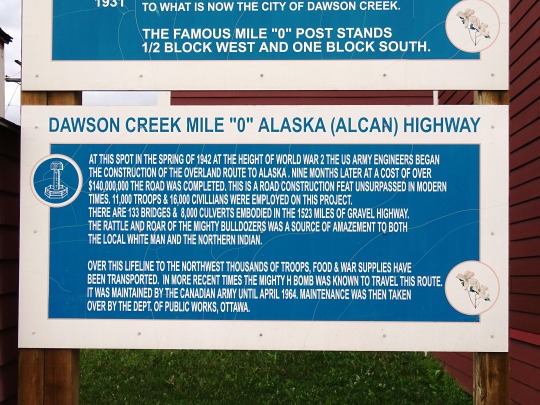

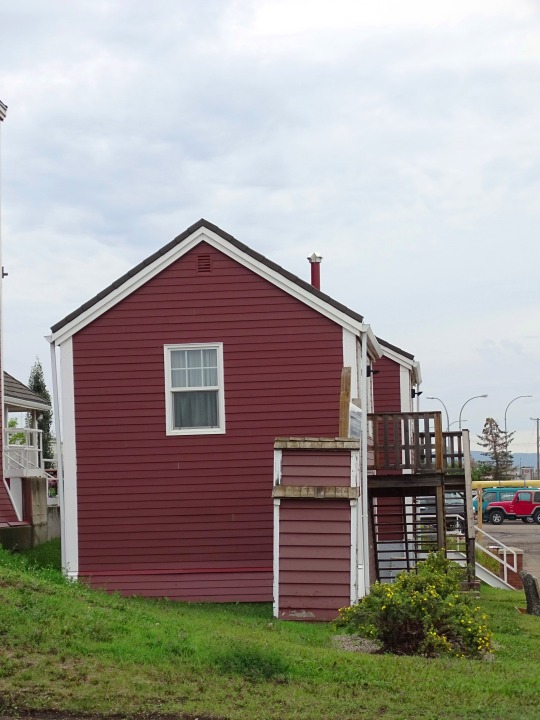


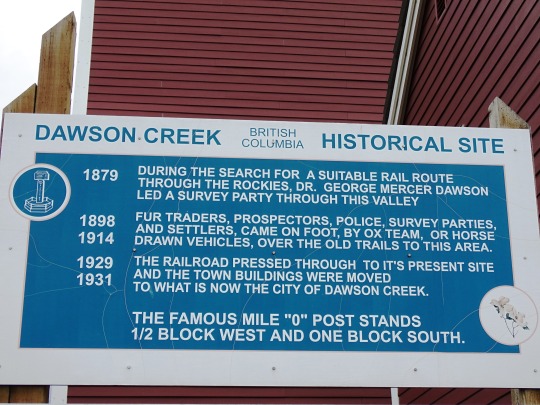

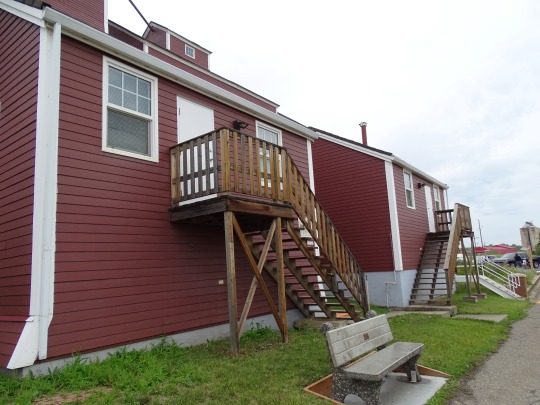
Dawson Creek, BC (No. 3)
Upon entering the war, the United States decided to build a transportation corridor to connect the US mainland to Alaska. In 1942, thousands of US Army personnel, engineers, and contractors poured into the city – the terminal of rail transport – to construct the Alaska Highway. The highway was completed in less than a year; even after the workers involved in its construction departed, population and economic growth continued. In February 1943, a major fire and explosion in a livery barn, packed with road-building supplies including dynamite, caused serious damage to the center of town; five people were killed and 150 injured. Dawson Creek became a RCAF station during WWII, in September 1944. The station disbanded in March 1946.
By 1951, Dawson Creek had more than 3,500 residents. In 1952, the John Hart Highway linked the town to the rest of the British Columbia Interior and Lower Mainland through the Rocky Mountains; a new southbound route, known locally as Tupper Highway, made the town a crossroads with neighbouring Alberta. The next year, western Canada's largest propane gas plant was built and federal government offices were established in town. In 1958, the extension of the Pacific Great Eastern Railway to the Peace from Prince George was completed, and the village was re-incorporated as a city. Between 1951 and 1961, the population of Dawson Creek more than tripled. The RCAF center reemerged on October 1, 1956 and was declared functional in 1958. It was disbanded a final time in March 1964.
Growth slowed in the 1960s, with the population reaching its all-time high in 1966, but area population increased. In the 1970s, the provincial government moved its regional offices from Pouce Coupe to the city, Northern Lights College opened a Dawson Creek campus, and the Dawson Creek Mall was constructed. Several modern grain elevators were built, and the town's five wooden grain elevators, nicknamed "Elevator Row", were taken out of service. Only one of the historic elevators remains, converted to an art gallery. Since the 1970s, with the nearby town of Fort St. John attracting much of the area's industrial development and Grande Prairie becoming a commercial hub, the town's population and economy have not significantly increased.
Since 1992, the city has undergone several boundary expansions. One expansion incorporated undeveloped land in the southeast for an industrial park and a Louisiana-Pacific Canada veneer factory. The city extended sewer and water lines to the location; however, the area was not developed and with the factory only half-built, L-P Canada abandoned its plans. A business making manufactured homes bought the factory and completed its development in 2005. Another expansion incorporated the existing oriented strand board factory in the northwest corner of the city, while further incorporations have included undeveloped land to the south and north.
Source: Wikipedia
#Dawson Creek Art Gallery#prairie elevator#Dawson Creek#NAR Station Museum#Visitor Centre#travel#original photography#vacation#tourist attraction#landmark#cityscape#architecture#British Columbia#summer 2023#Canada#Alaska Highway#NAR Park#Alcan Highway#downtown#northeastern British Columbia#BC#Alaska-Canadian Highway#street scene#Northern Alberta Railway Park#flora#flower#tree#log cabin#Mile Zero Post
4 notes
·
View notes